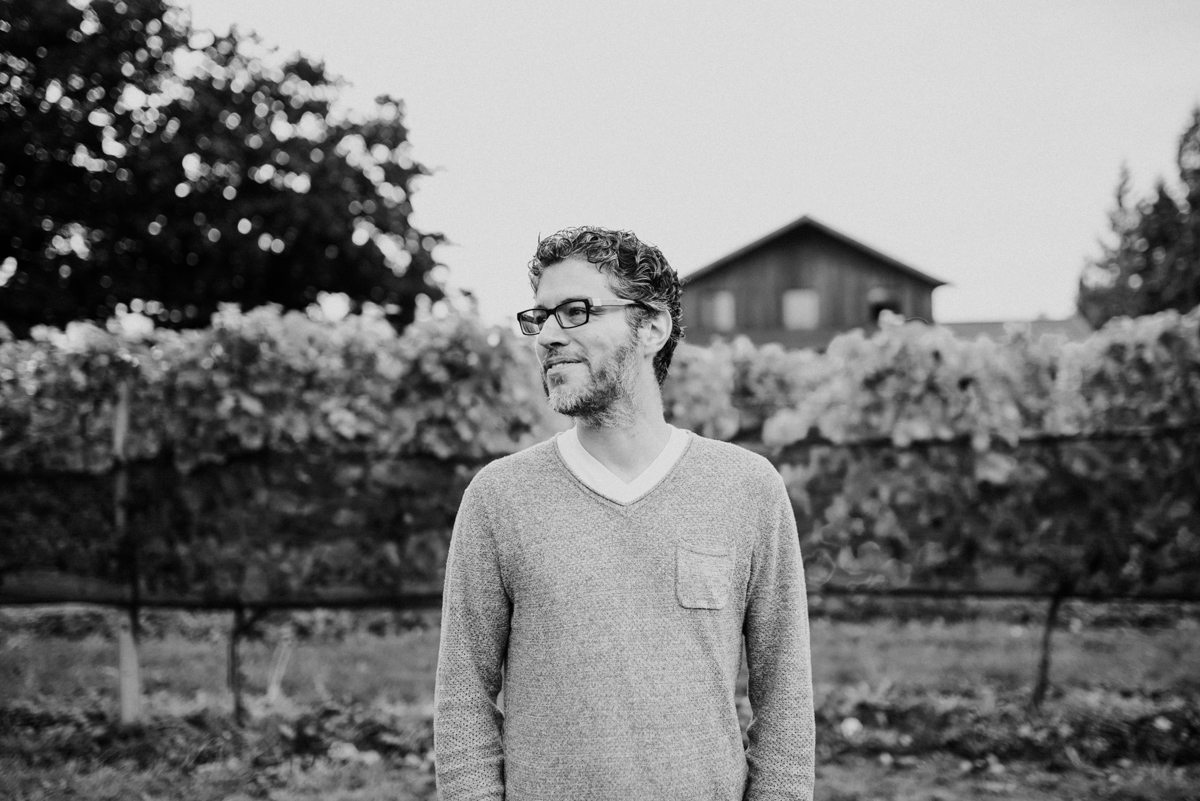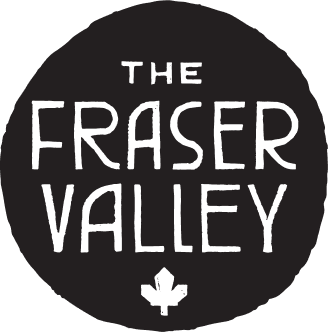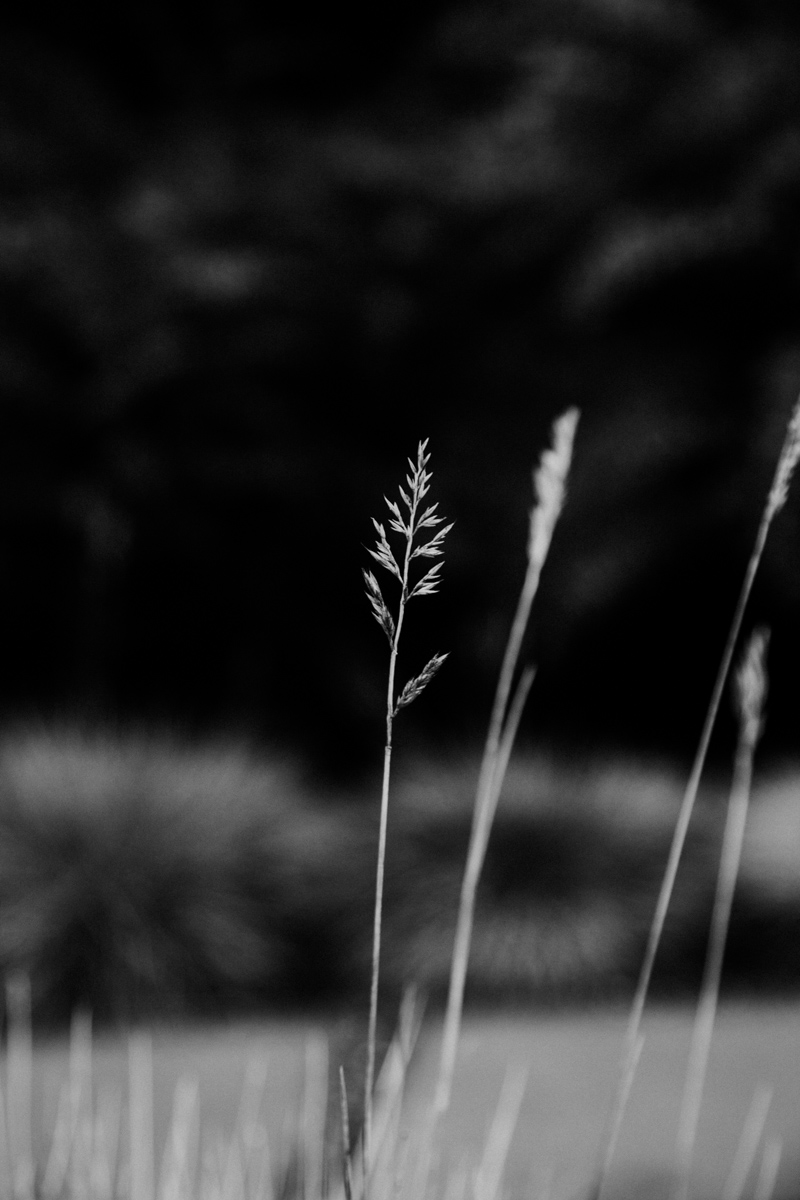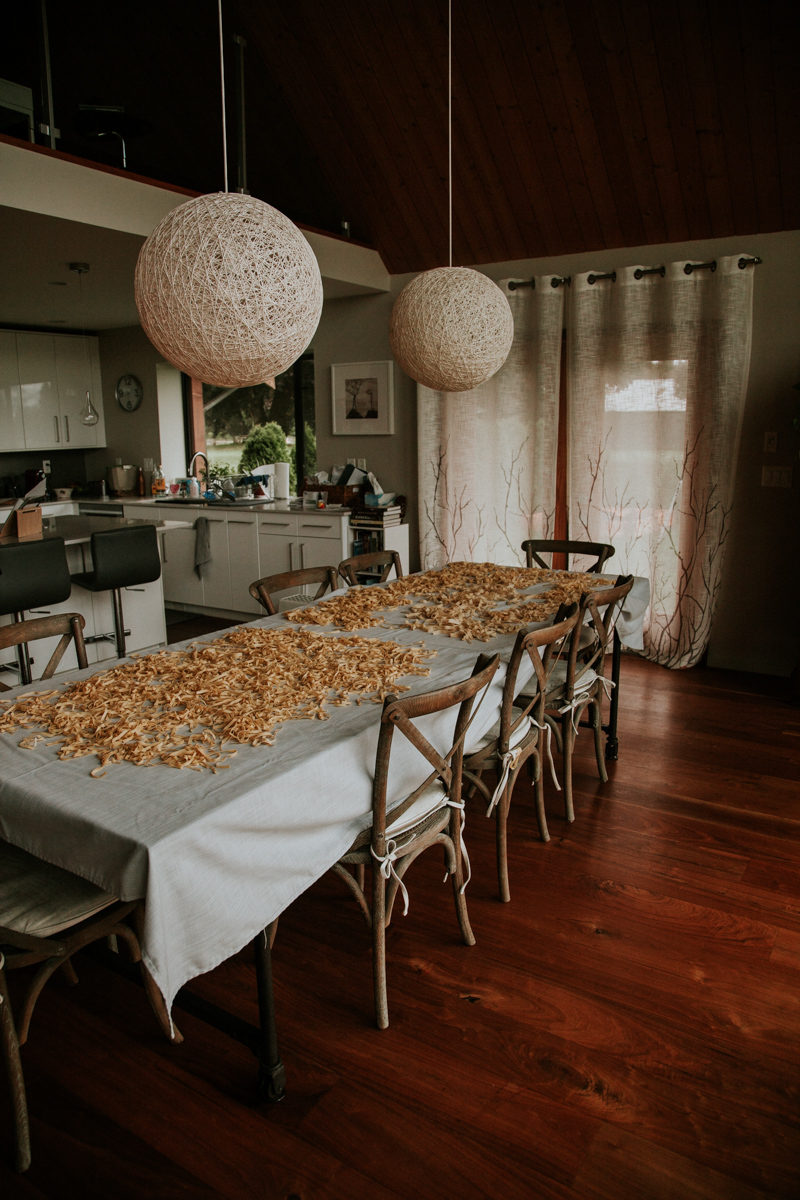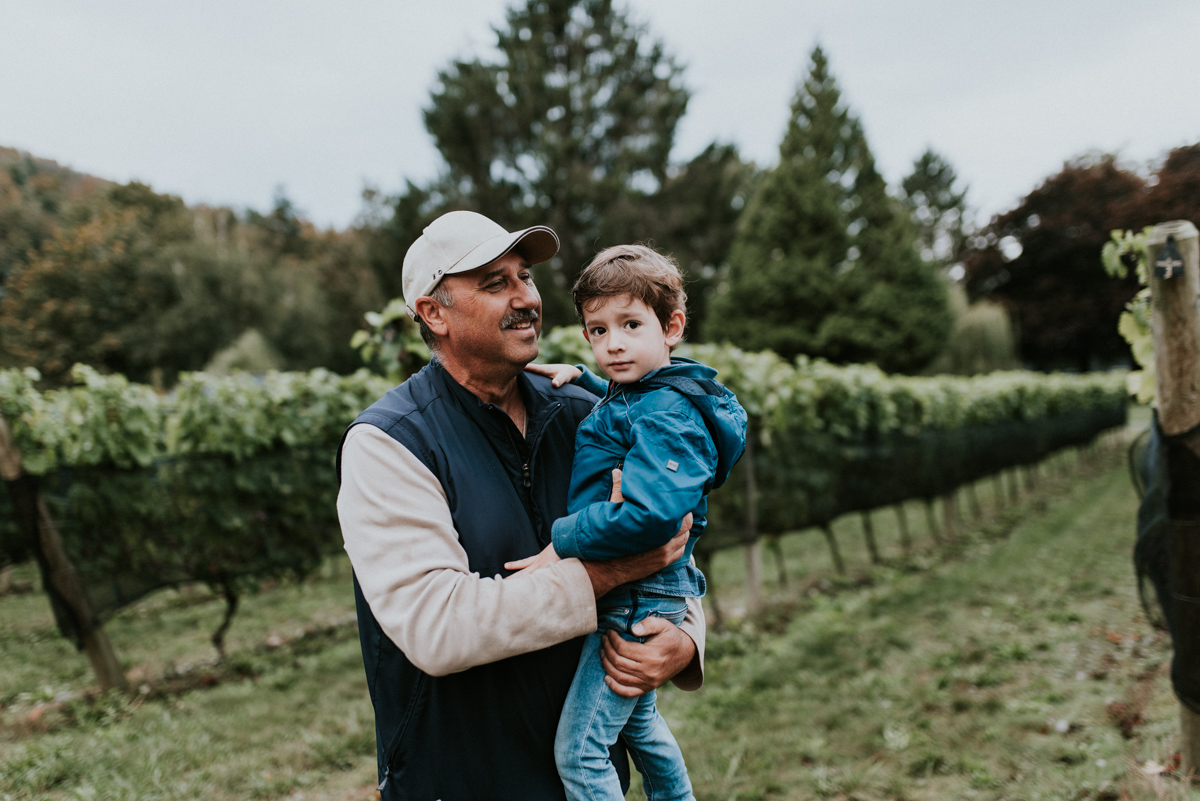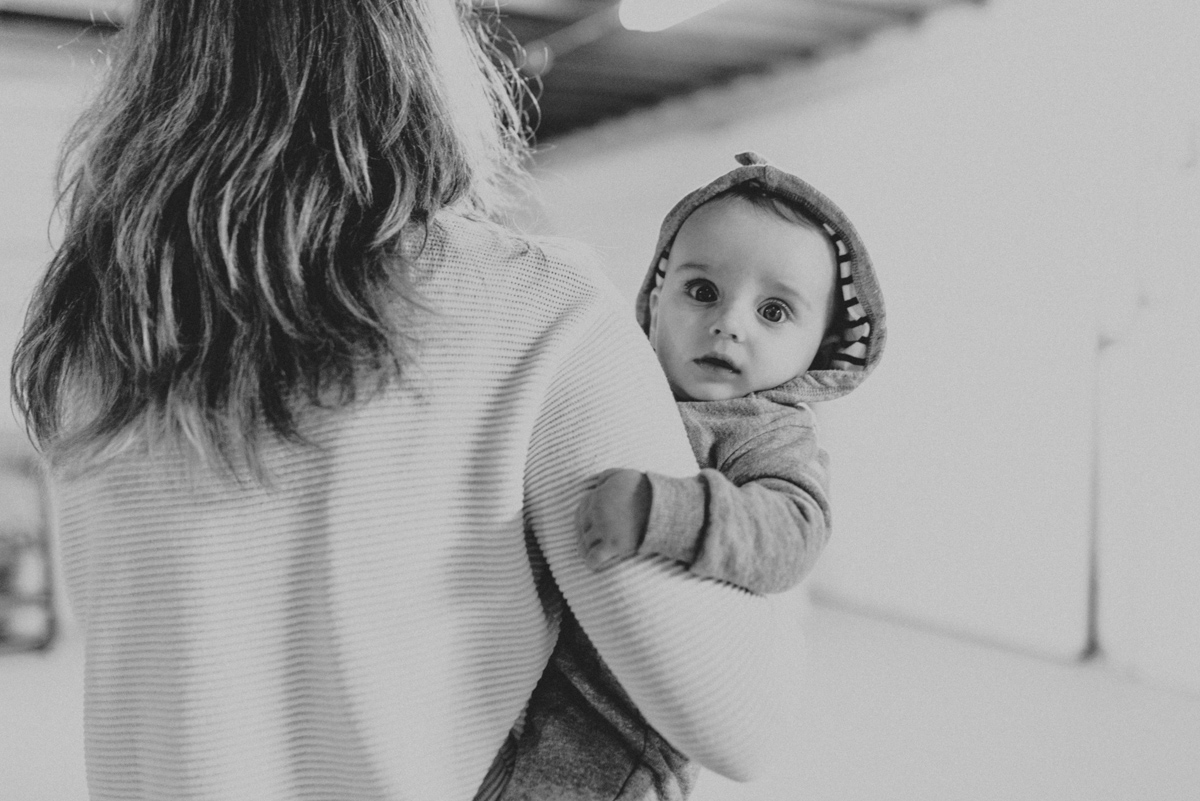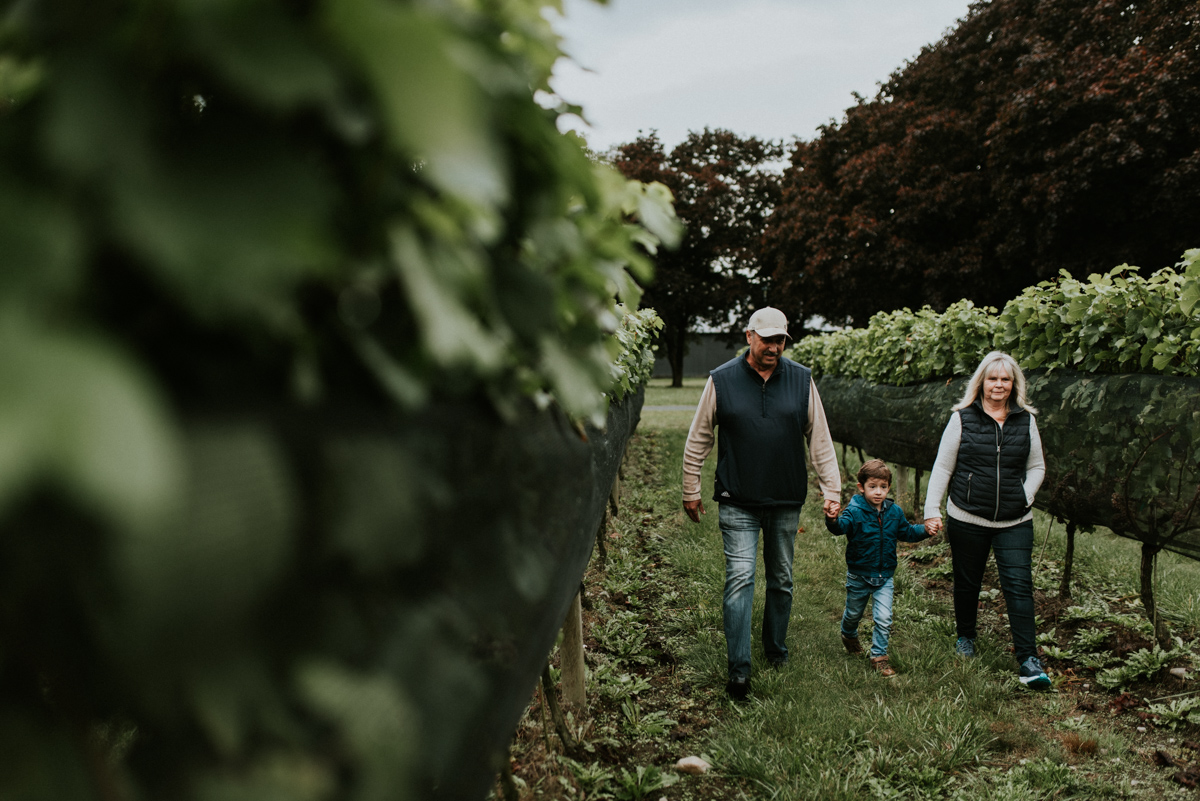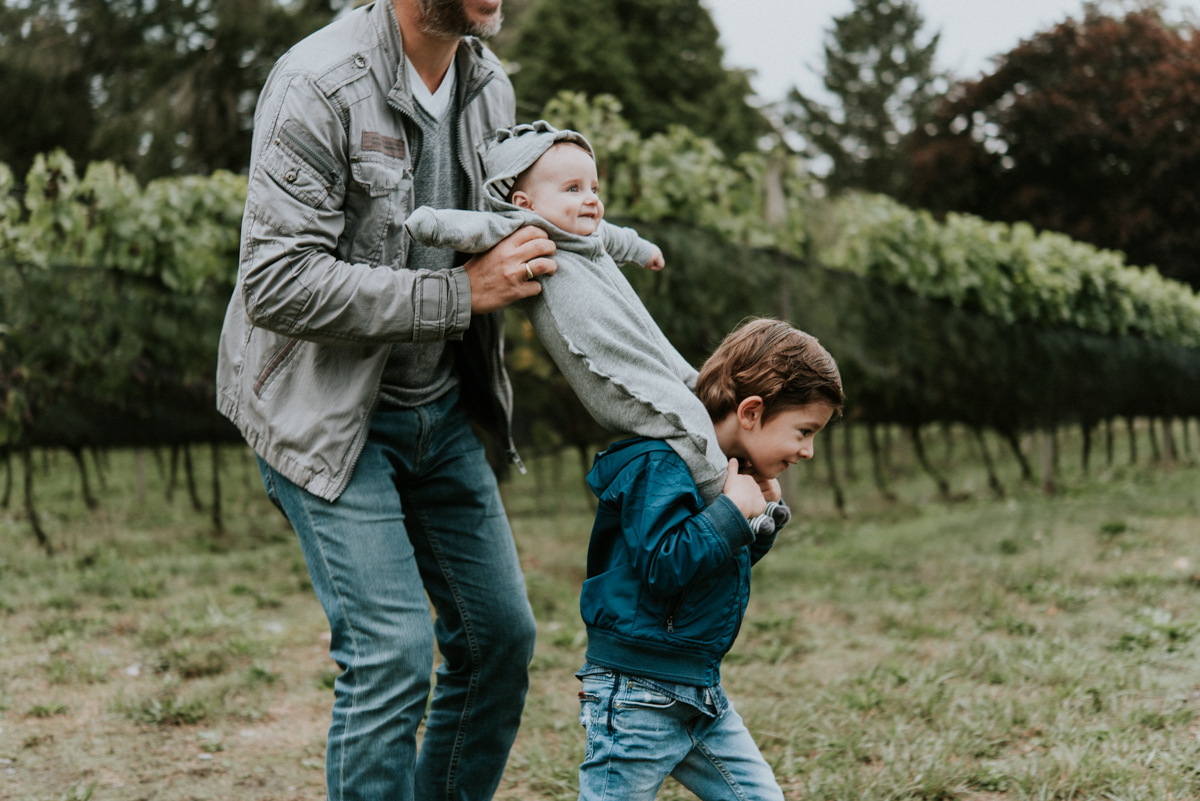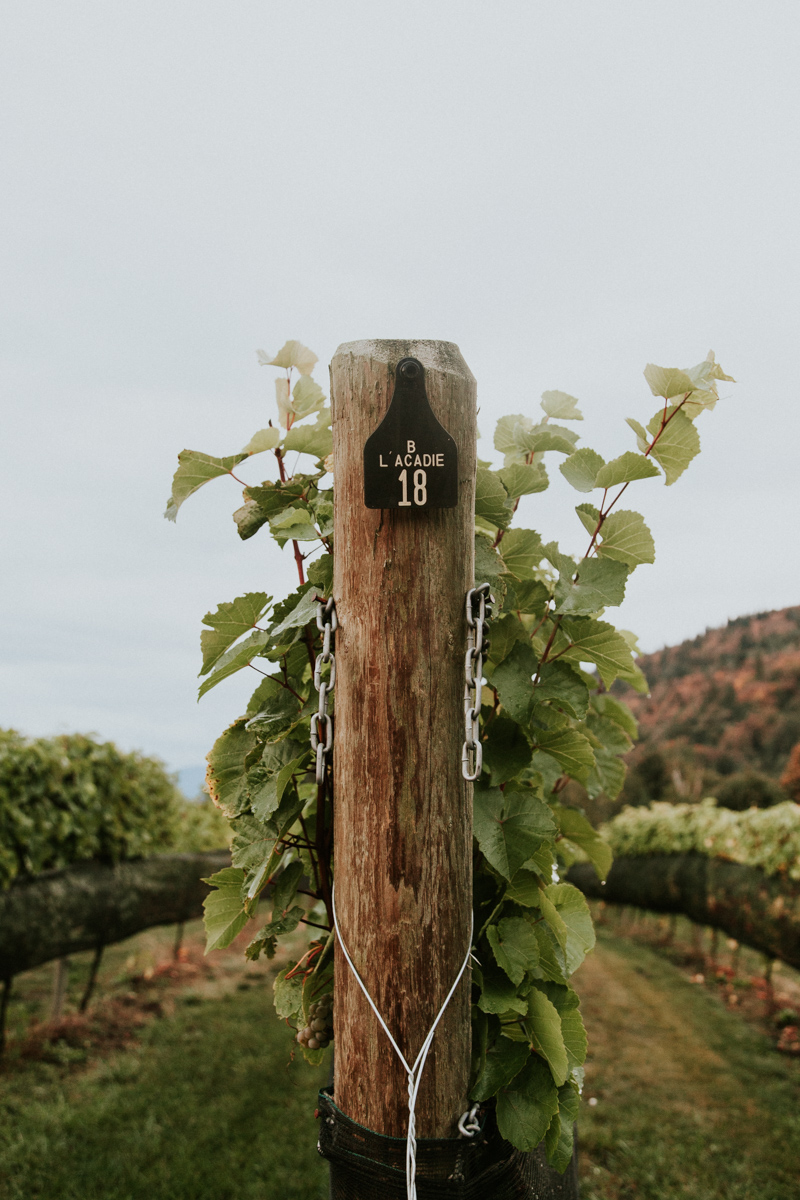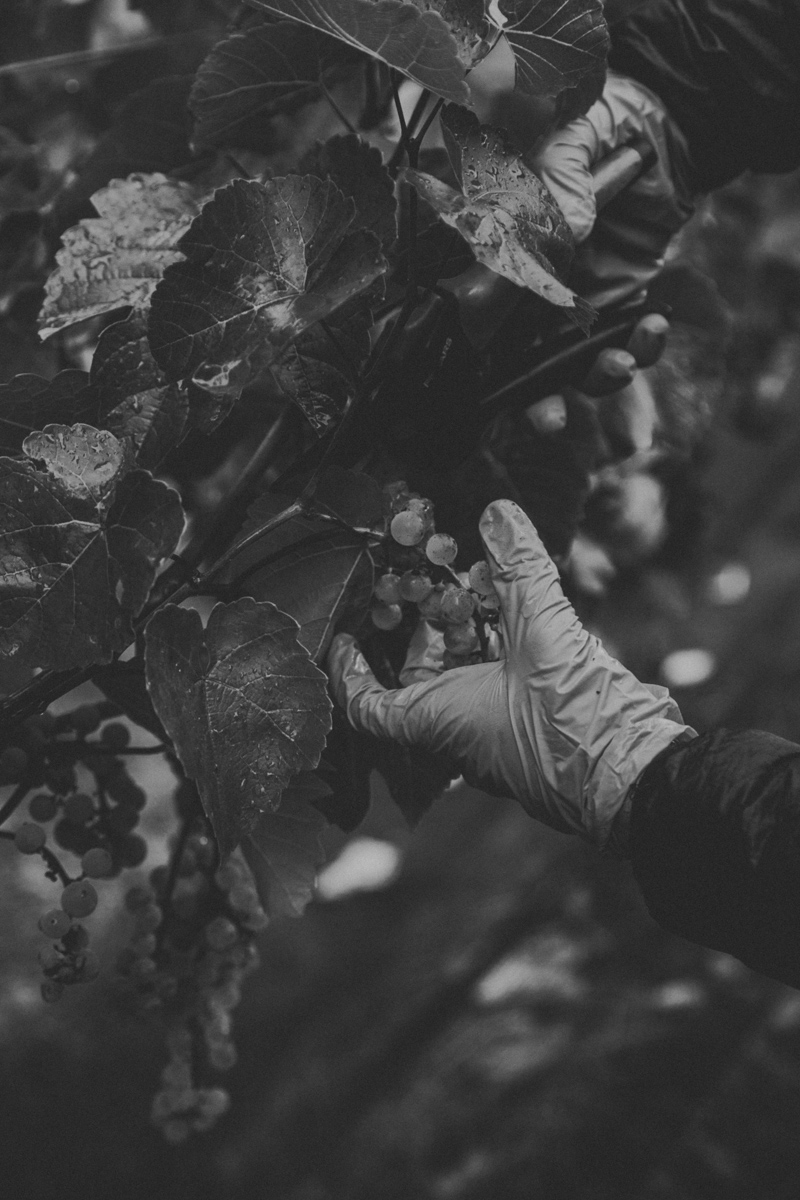A winery on the rise. Whispering Horse is a family-owned boutique winery that treasures the uniqueness of their land and the role it plays in differentiating the wines they produce. From growing and nurturing their grapes, to hand-labeling and corking their bottles, Whispering Horse fully embodies the concept; from ground to glass.
Joining the family on the day of their harvest, we started our time in the vineyards prepping the rows, before their friends and family came to help harvest the wine grapes. We then made our way into the winery to learn their production process before heading back to help harvest. It was a heartwarming experience to witness their community come together and the perfect finish to our day.
TFV: Can you share the story and history behind the name “Whispering Horse” Winery?
Melissa: Our winery’s name, Whispering Horse, was inspired by the history of the land, which was first established in the early 1960s as J-Bar ranch, where John Giesbrecht (my grandfather and Barry’s father) bred, raised, and trained hundreds of quarter horses for over 50 years. When Barry, my Dad, was young, he worked on the ranch, breaking colts, up until the age of 21. Later, he eventually settled on the property directly adjacent to the ranch with Shirley (my Mom), and as a result, always remained connected to this piece of land. Growing up, I, along with my brother, Tyler, and sister, Alanna, also spent weekends working and learning to ride horses at J-Bar. Undoubtedly, to us, J-Bar ranch became a place powerfully infused with many deep memories.
My grandpa admirably rode his horses until he was 86 years old, but eventually the ranch became too much for him to manage with his increasing age and as a result, decided it was time to sell. As a family, it was really difficult to see the piece of land that he had poured his heart and soul into for so many years, go. It was then, in 2010, that I and my husband, Laurent, approached my Mom and Dad about the possibility to keep J-Bar ranch, but with a new purpose.
After a lot of research and many discussions, we decided to take the plunge. Fed by a common enthusiasm and love for wine, the decision was made to buy J-Bar ranch and transform it into a family-run boutique winery.
In wanting to preserve the memories and spirit of J-Bar ranch, we chose the name Whispering Horse. We felt this name captured the soft, elegant, and subtle styles of wines we hoped to create, while also paying homage to my grandpa and the history of the property. Also, while brainstorming names, we learned that one of my grandpa’s first horses was named Whispering Sandy, and then we just knew – Whispering Horse it was! We also chose to locate our winery within the existing walls of the old riding arena. This means our winery now sits atop the very place where we all had spent so much time riding, keeping these memories dear to our hearts while transforming the property’s purpose.
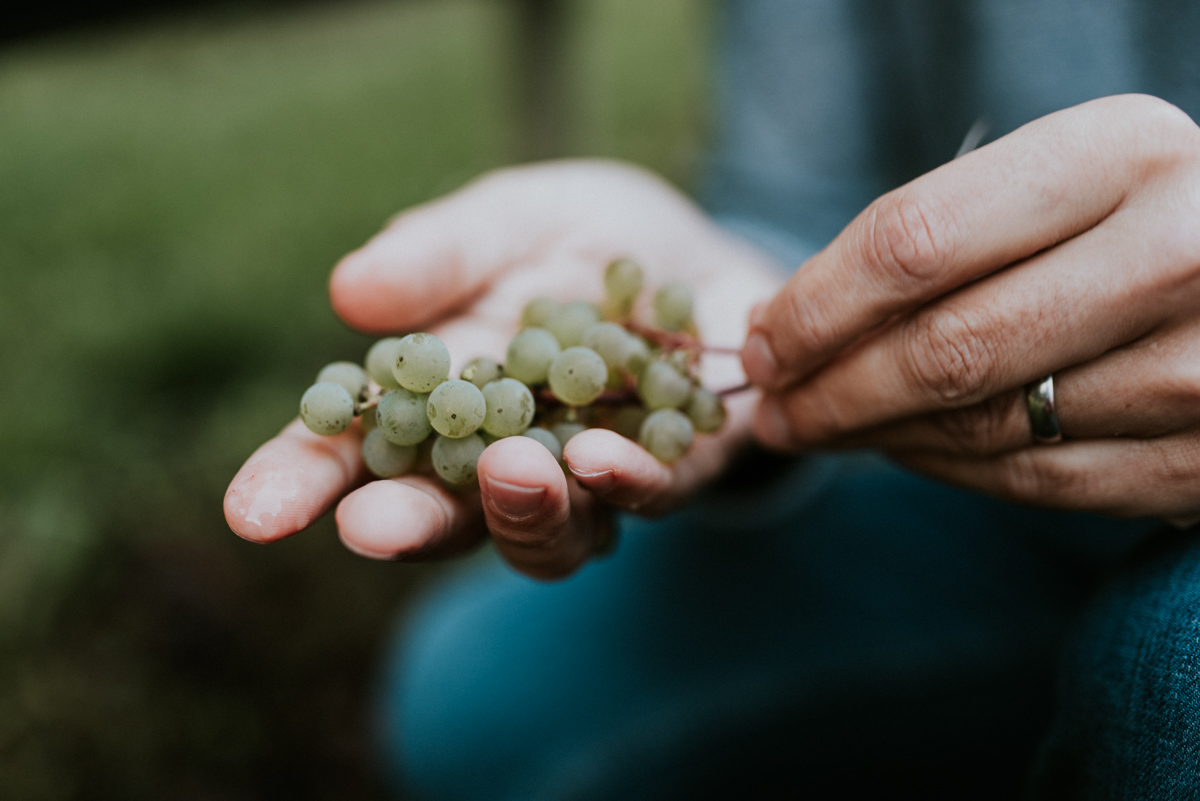
TFV: What are your backgrounds, and how did you and your wife meet?
Melissa: Laurent was born in Liège, Belgium (2 hours from Champagne, France) from Italian parents, where he grew up surrounded by amazing wines. Although he always loved wine, his background is in the arts, particularly in writing poetry, which has been published into six books (with a new wine-inspired book coming out next year!). Academically, he received a BA degree in French Literature, with a specialization in African Literature. Today, he teaches French Literature in a Conseil scolaire francophone high school in Surrey to grades 10, 11 and 12.
I was born and raised right here in Chilliwack, but always loved to travel. I had the opportunity to work overseas, in Japan, throughout my youth and after high school, left to backpack for a year. I came back to Montreal Canada, where I pursued my BA degree in Geography, with a minor in Anthropology. I then continued on academically to receive my PhD in Health Geography at SFU in Burnaby and today work as a Post-doctoral researcher for various projects at the University of Victoria.
How we met is actually pretty cliché and we always have a good laugh about it. Laurent and I were both in Montreal, I had just finished my degree and was working in a French environment at the Université de Montreal, so decided I needed to improve my language skills. I enrolled in a French class at the YMCA, and Laurent was my French teacher. That was how we met. After the session was over, Laurent left to take a position as a French teacher in the north of Mexico (Saltillo). I was also finishing up my time in Montreal and had planned to backpack across Mexico, beginning with a month of Spanish language school in the South of Mexico (San Cristobal, Chiapas). We had remained connected as friends during these transitions and decided to meet up in Mexico. And, that was where our first ‘date’ basically became a three-month long backpacking trip across Mexico together. We’ve been together ever since.
Barry: I was born and lived in Yarrow my entire life. At an early age horses became an active part of my life, learning to ride and work at the horse ranch. At age 13 I began competitively showing Quarter Horses throughout B.C and Washington State. I and my horse Chev’s Bar won many awards the next few years. When Chev’s Bar was sold to California I stopped showing but always continued riding for my Dad working his young horses. I finished high school at Chilliwack and then spent the next two years working on my brother’s cattle ranch in the Cariboo. Returning back, I started working at my Dad’s business Pioneer Building Supplies. I have been there ever since and manage the operation.
Shirley: I was born in Calgary, Alberta, but moved to the West Coast when I was nine years old. I graduated high school at North Delta Senior Secondary, but did not continue with any further formal education. I was employed by a few different companies in retail, waitressing, as a medical switchboard operator, and later some other insurance companies. I had moved to West Vancouver with a girlfriend by this time. Her parents owned some property at Cultus Lake and sometimes we would go and stay there for the weekend. Our social time included going to clubs and dance halls to listen to live bands and dance. This was how I met Barry – We met at a club in Chilliwack through a mutual friend. We struck up a conversation, which grew into a friendship, and as they say, the rest is history! We just celebrated our forty one year anniversary this past year.
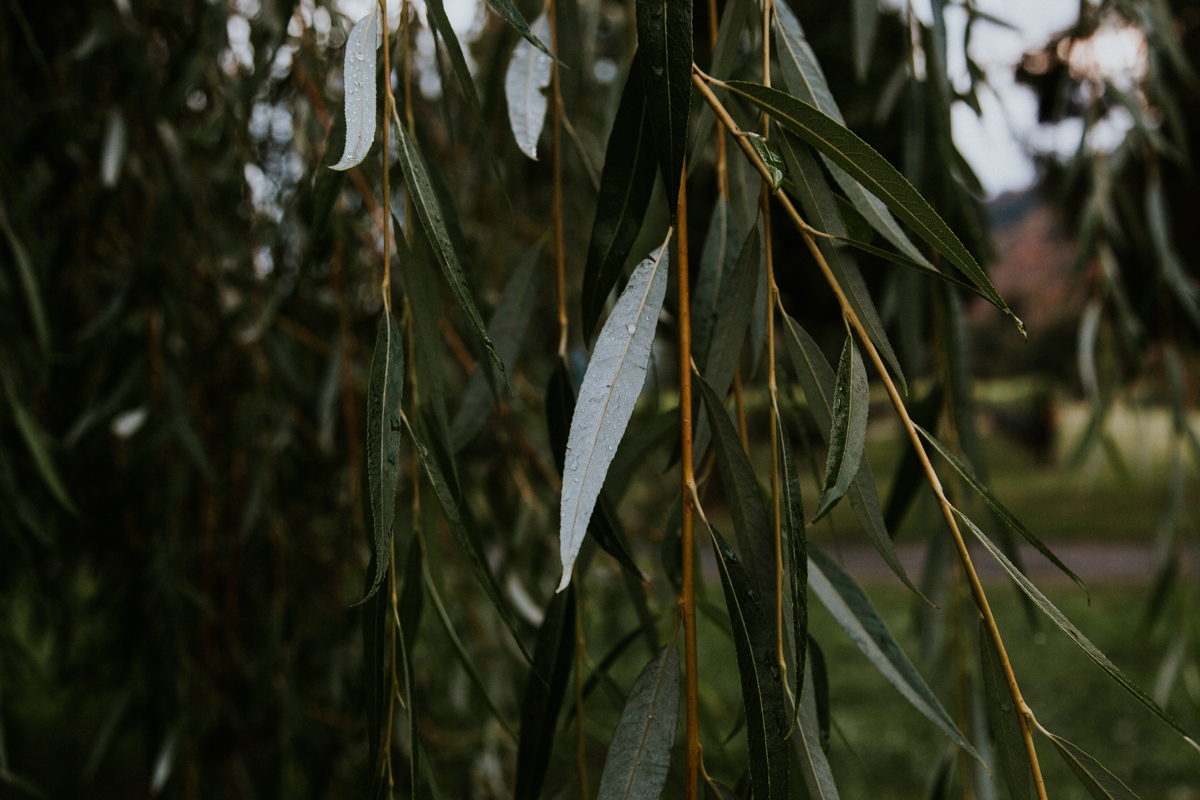
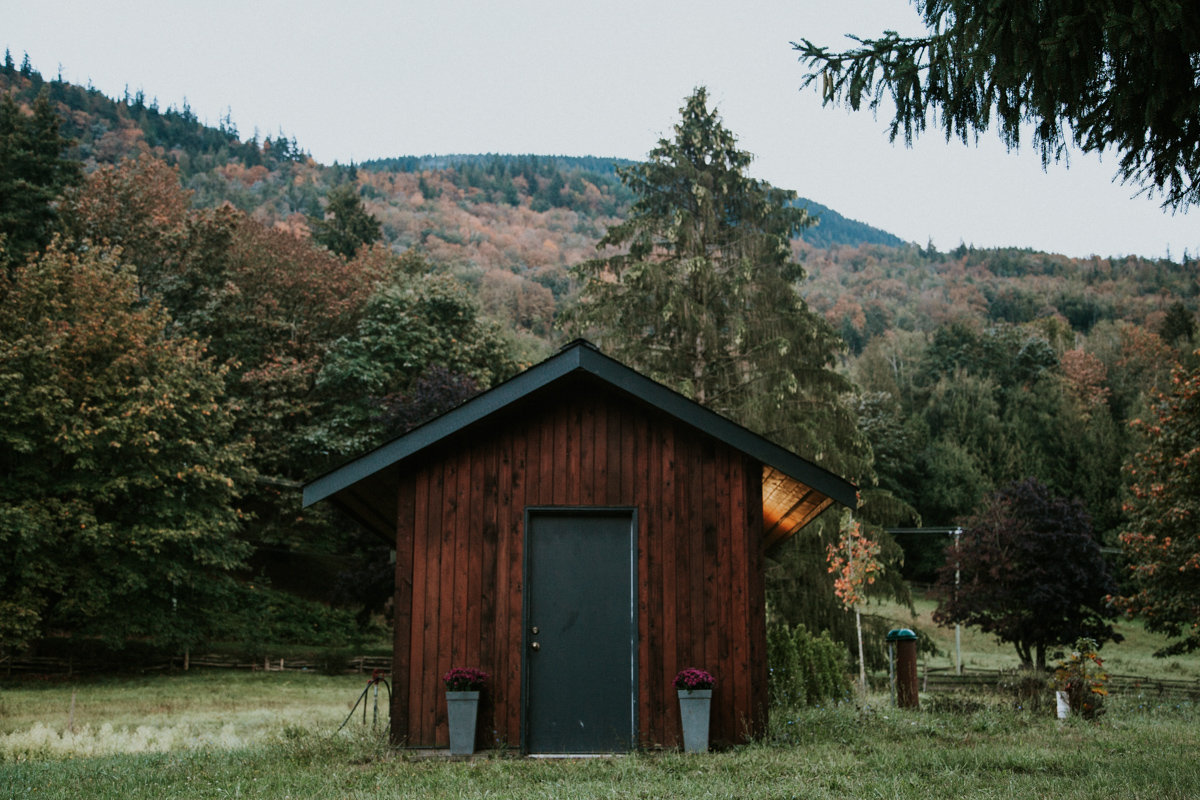
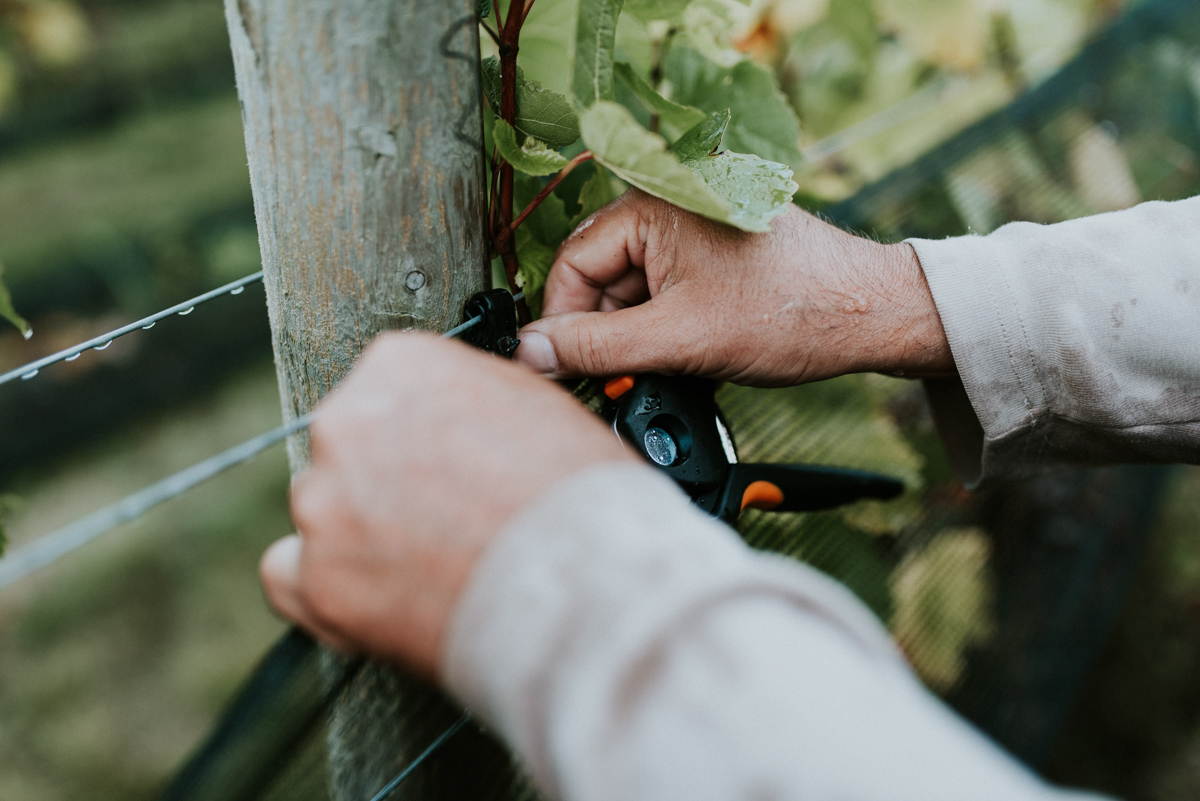
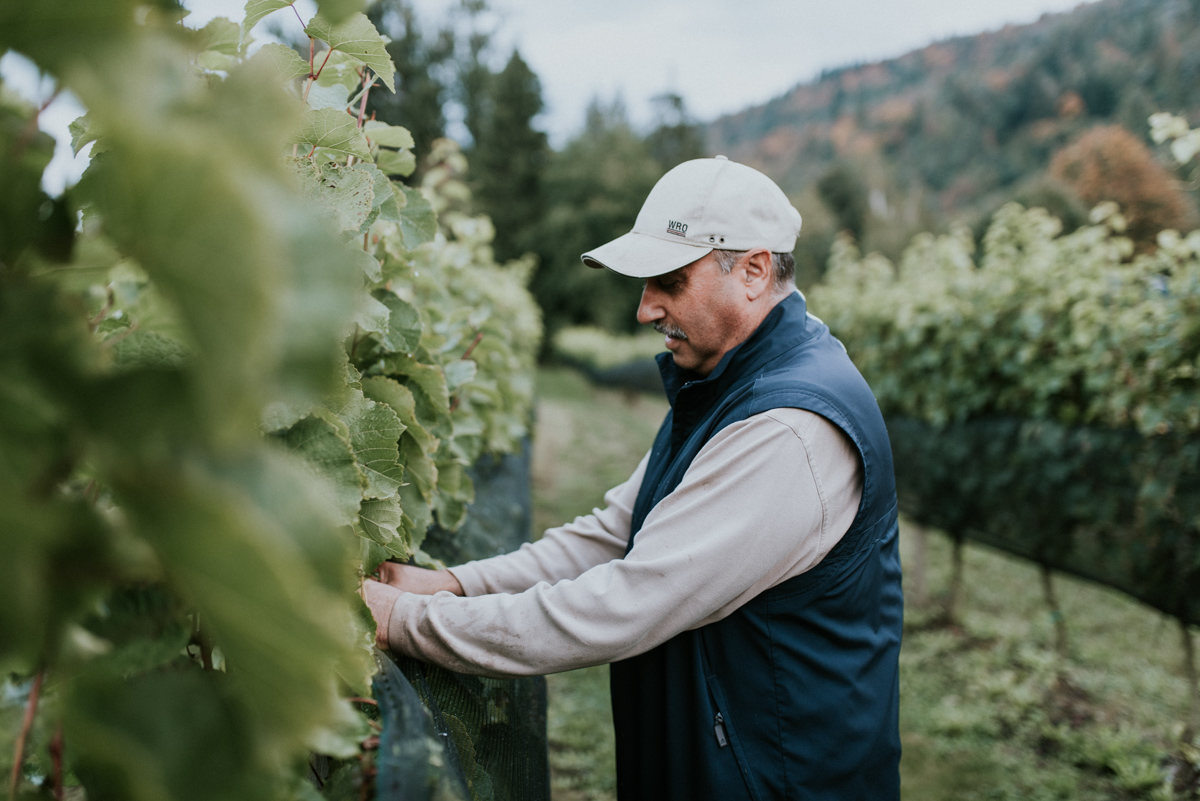
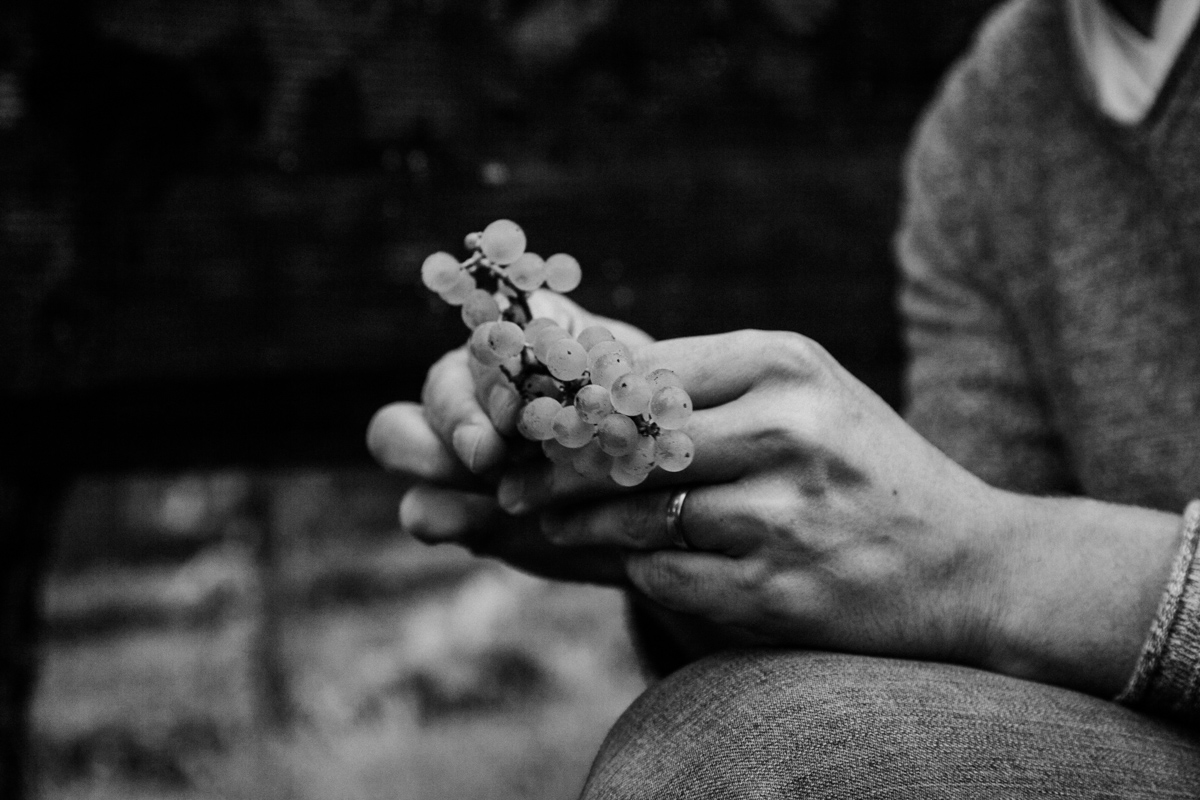
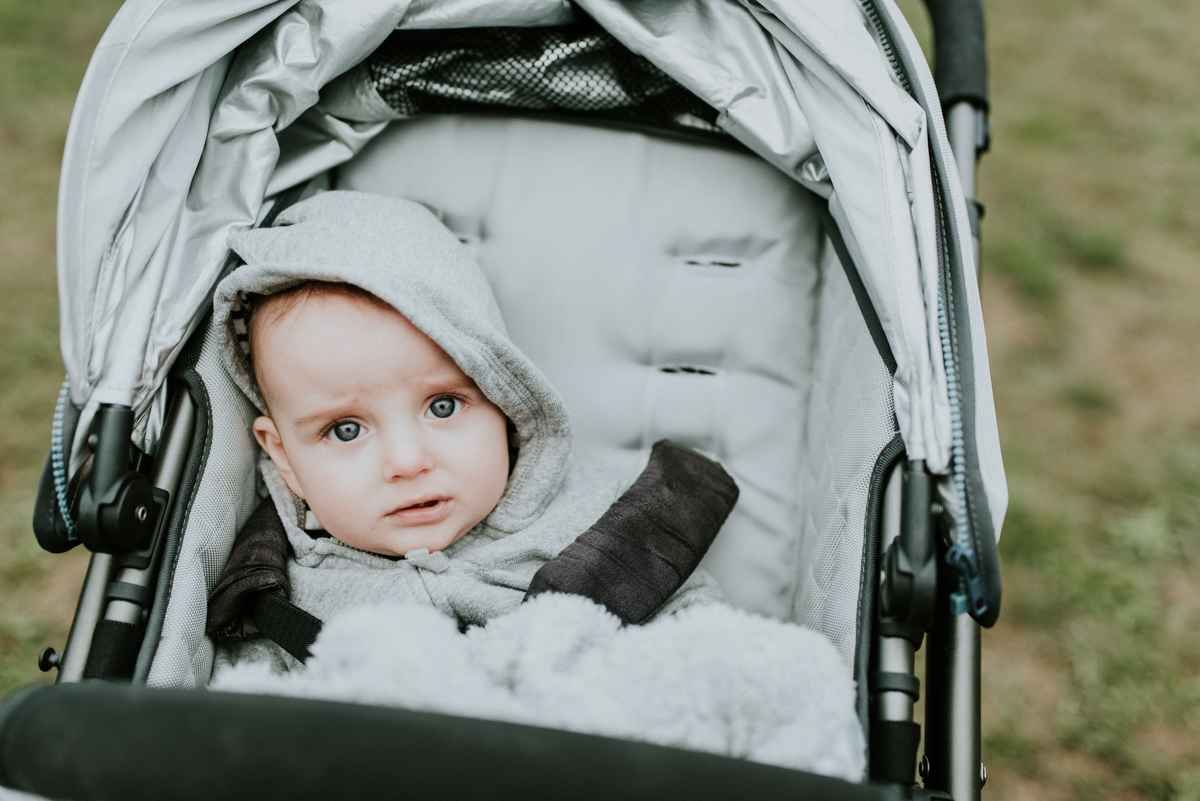
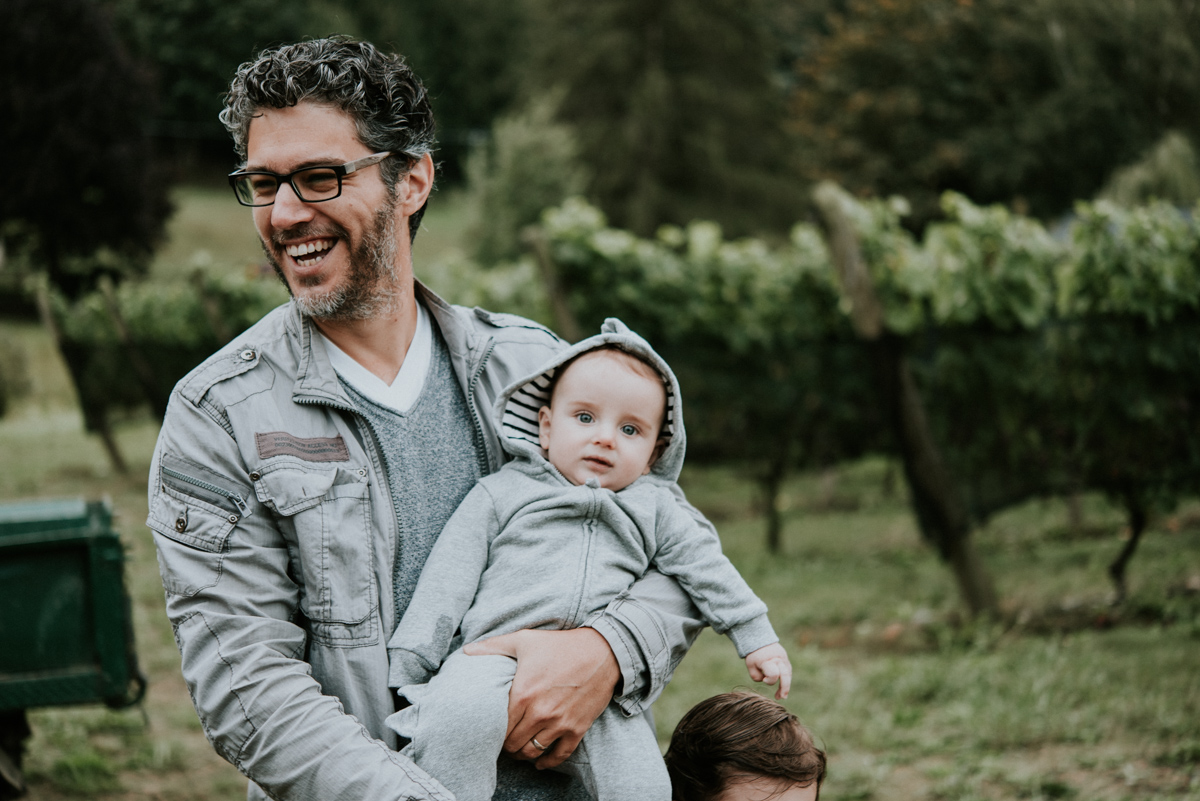
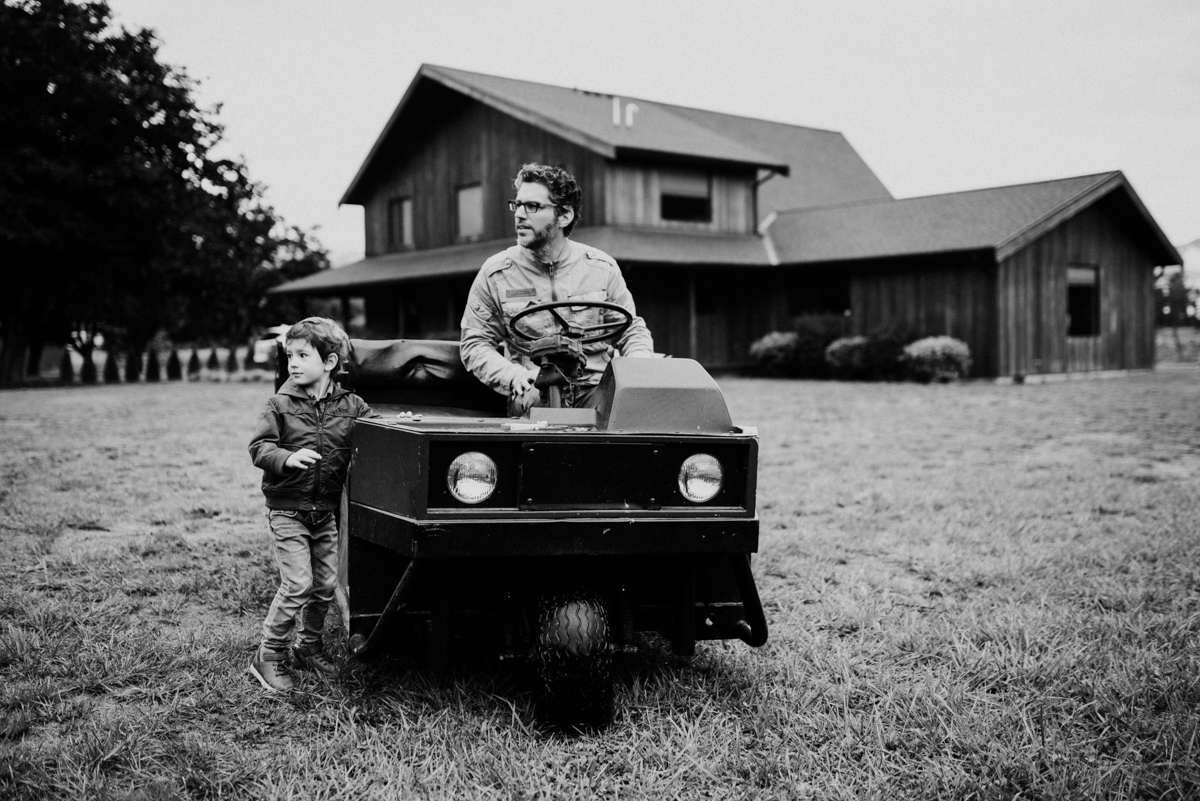
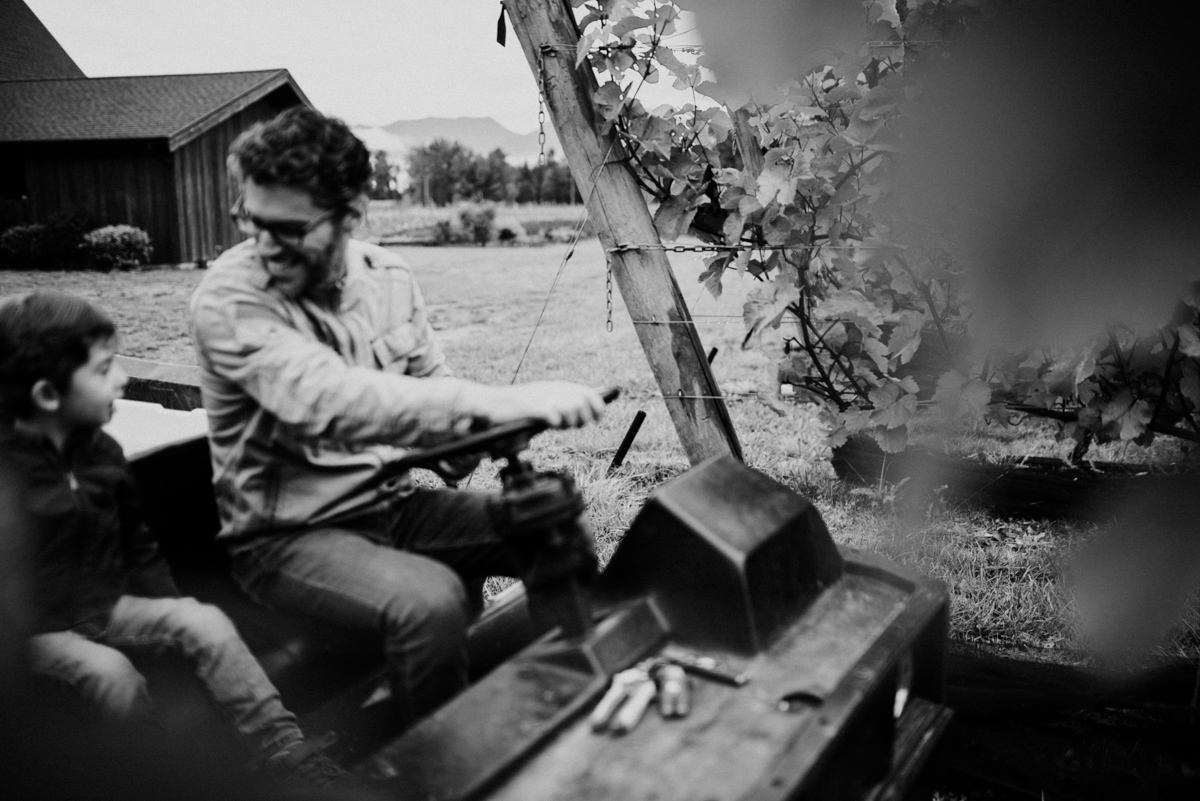
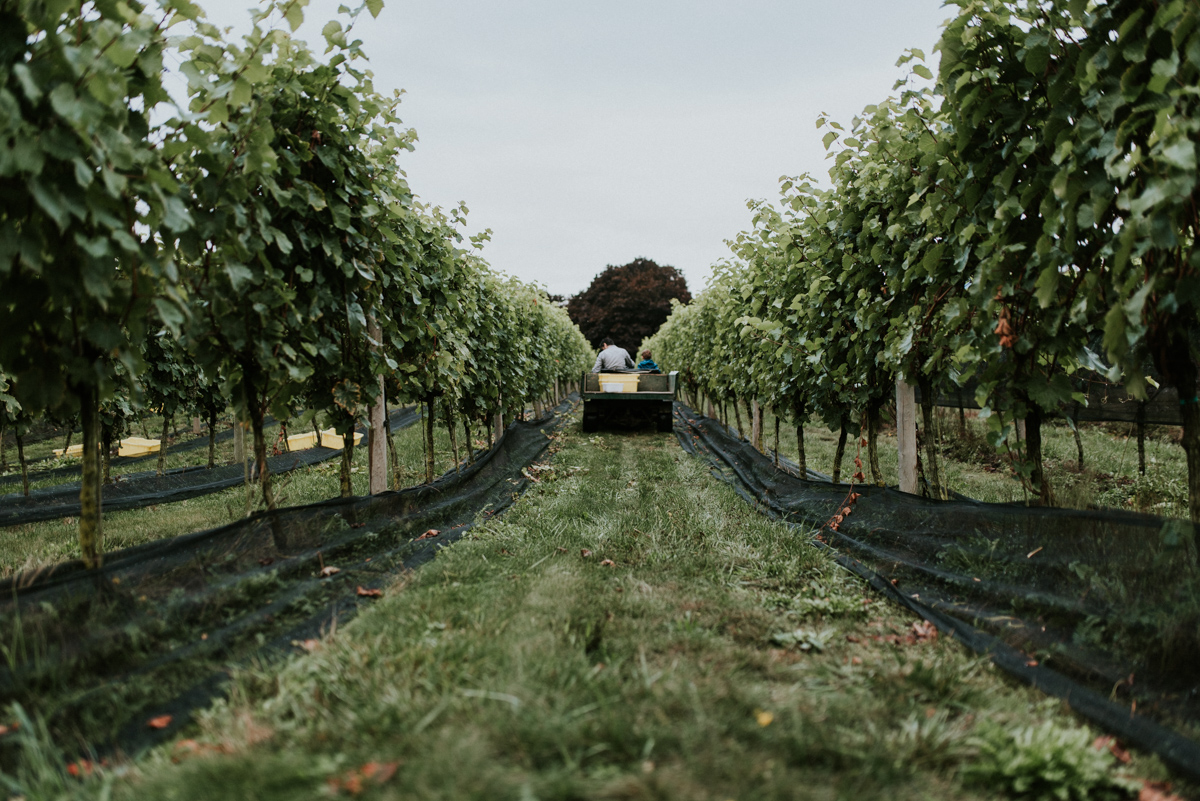
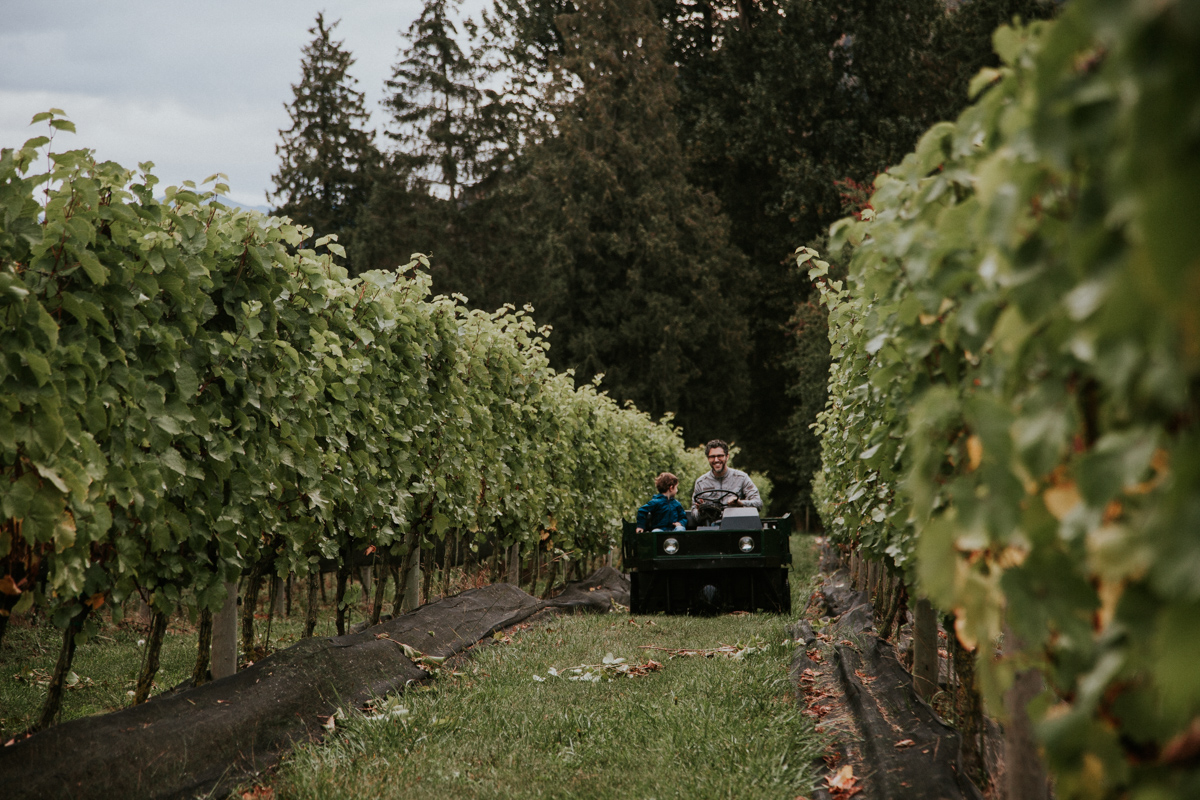
TFV: What pushed you to make the decision to start and open up your own winery?
Melissa: It’s funny, because none of us have a background in wine! The idea to move into wine professionally was actually sparked while Laurent and I were walking the Camino de Santiago in Spain. I was pursuing my studies in Canada and Laurent, like any immigrant, was struggling to find his place here. We brainstormed about things he loved, and wine came up. Also, with his fluency in French, Italian, and Spanish languages, we thought that would really open up the doors to some amazing worlds of wine. Coming back from Spain, he pursued a sommelier program and received the WSET3 diploma, but realized he was more interested in making wine. We thought of maybe moving to Italy to make that happen. To see if it was feasible, Laurent did an apprenticeship on a vineyard in Montalcino, where he learned wine-making and also got a bit of an idea regarding our potential if we were to move to Italy. It was also at that time that the selling my grandfather’s property was being discussed. Someone joked to us that we should “open up J-Bar vineyard!” And it was actually that joke that planted the seed. We did a ton of research and after that, approached my parents with the idea – thinking they would just laugh. But, they didn’t and actually thought it was a great idea! After even more research we decided, together, to take the leap. And now here we are.
TFV: Can you describe what your vineyard philosophy is and how it relates to the vision of your wines?
Melissa: We hold strong convictions regarding our responsibility to respect the environment and ensure our land is treated in a sustainable manner. We also hold great admiration for those winemakers who follow the philosophy of ‘terroir’; an approach to wine that encompasses all the factors that play a role in differentiating one vineyard site from another, allowing the uniqueness of each piece of land to shine through the wine. These factors include the soil where the grapes are grown, the climate of the vineyard and its region, the choice of which grape variety to plant, among others. In other words, terroir emphasizes that wine is made in the vineyard, not in a winery. This means that for us, rather than bringing in grapes grown elsewhere (e.g., from warmer climates such as the Okanagan or even California in order to produce bigger bodied red wines) we only use grapes that we grow right here. This allows us to produce wine that reflects where we live, crisp whites and rosés from our cooler climate and a subtle minerality that comes from being situated above an old river bed, creating a soil type of sandy loam, with a lot of river rocks and pebbles braided throughout.
Laurent: We are working towards crafting wines with minimal intervention in order to truthfully express our terroir. You won’t find new oak barrels or fancy equipment at our winery. We try to do things in a natural, simple fashion, limiting any type of addition to the wine to the bare minimum. That being said, you can’t be too dogmatic about it, especially when new to the winemaking business. Before starting, I had a lot of ambitious ideas and strong convictions, but I had to take a more humble approach. First, let’s make a good, honest wine, even if it means using commercial yeast for example. In the near future, we intend to only ferment with indigenous yeast and we are getting closer to achieve this goal, but patience, as we learned, is key.


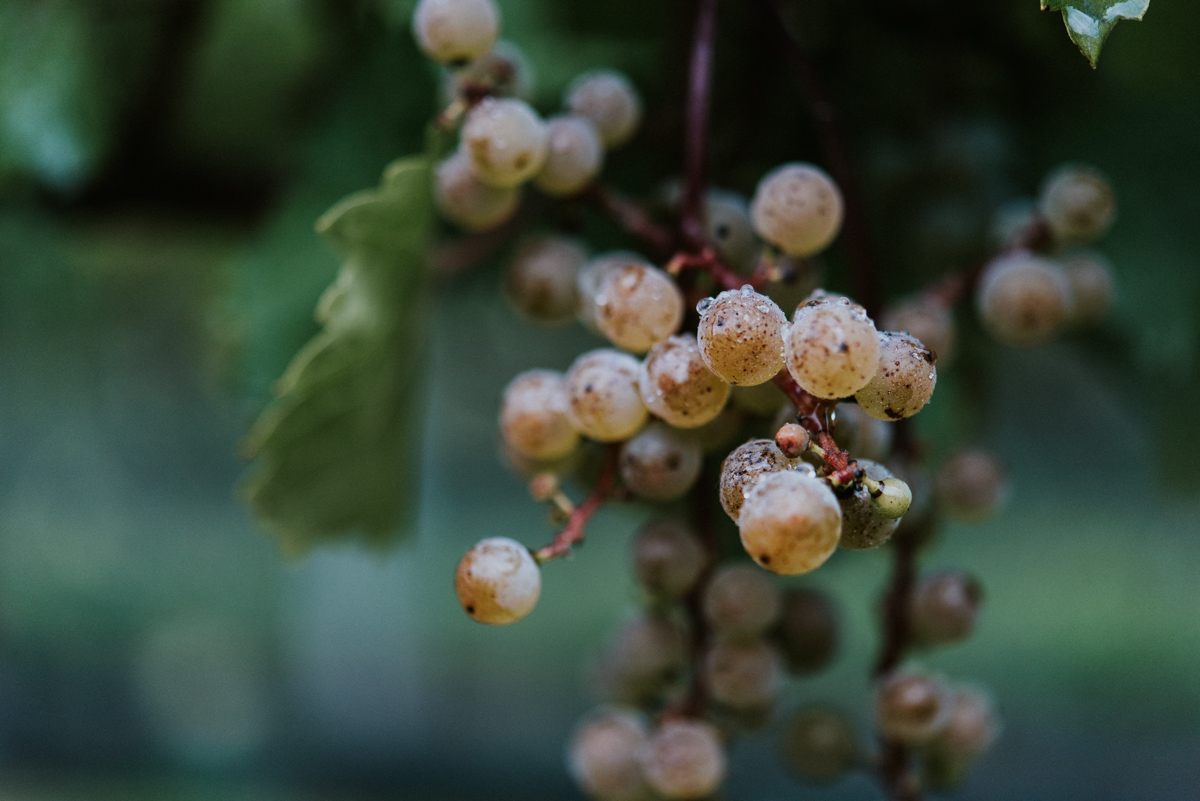
TFV: What does sustainability mean to you? How do you put it to practice in your daily work?
Melissa: For us, the concept of sustainability was employed from the very beginning when we were defining what ‘kind’ of vineyard/winery we wanted to be. By focusing on terroir, we needed to ensure that we selected varieties that were suited to our particular climate. Being in a cool-climate region, which is characterized by a relatively short growing season, we chose early to mid-ripening varieties consisting mostly of French-American Hybrids as well as some Vitis Vinifera. This meant choosing varieties that perhaps people had never heard of before, like L’Acadie, Epicure, or Seyval Blanc, but which offer an above average disease resistance level, which considerably reduces the need for spraying harsh fungicides and pesticides. Also, rather than planting massive blocks of singular varieties, we have our varieties dispersed across the property in smaller half- to one-acre plots. This lends itself to maintaining a level of biodiversity across the property. In addition, rather than completely clearing/filling the land to create the most efficient blocks for planting vines (as some have done), we decided to work with the land. We’ve left all the existing trees standing and have rows of vines that run alongside a small stream, which is filled with so many frogs, blue herrons, and even the occasional salmon (when the stream is flowing in the spring). Between the rows and under the vines is a cover crop of variety of grasses and of course all the natural groundcovers that grow here, including clover (an excellent nitrogen fixer). Being small-scale, we reduce the need for any large machinery aside from our small tractor and a little green car we’ve named ‘the kushman’. Almost all the work of managing the vineyard and canopy is done on foot and by hand. After harvest, we compost the pomace and use that to spread in the vineyard the following year. We really have a respect for the land and all the life that lives here, so we do our very best to reduce our impact and ensure everything that inhabits this property (including our children and us!) thrives in a happy and healthy environment.
TFV: You will soon be offering sparkling wine. How is your process of making sparkling wine differ from non-sparkling?
Laurent: When making sparkling in the traditional method, the wine undergoes two fermentations: the first one consists in a typical alcoholic fermentation done in a tank (same as for still wine), the second is a re-fermentation in bottles after the addition of sugar and yeast. It is this second fermentation in the bottles that create the bubbles. The wine is then aged in these bottles for a minimum of 18 months, after which, the bottles are turned upside down and riddled in order to bring all the lees into the neck of the bottle. Once the wine is clear and all the lees are settled in the neck, the bottles can be disgorged. After that, the bottle is then corked and ready to go. As you can see, the process for sparkling is a lot longer and time-consuming then when making still wine, and leaves very little room for error.
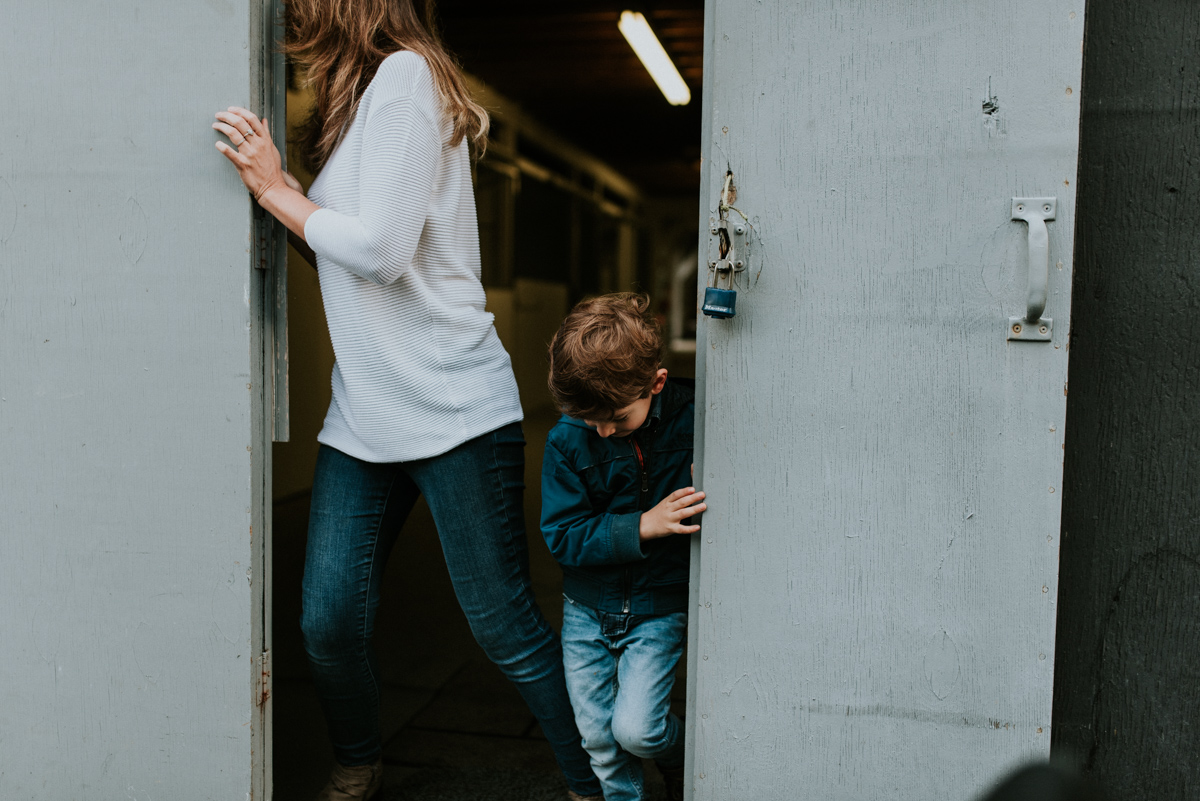
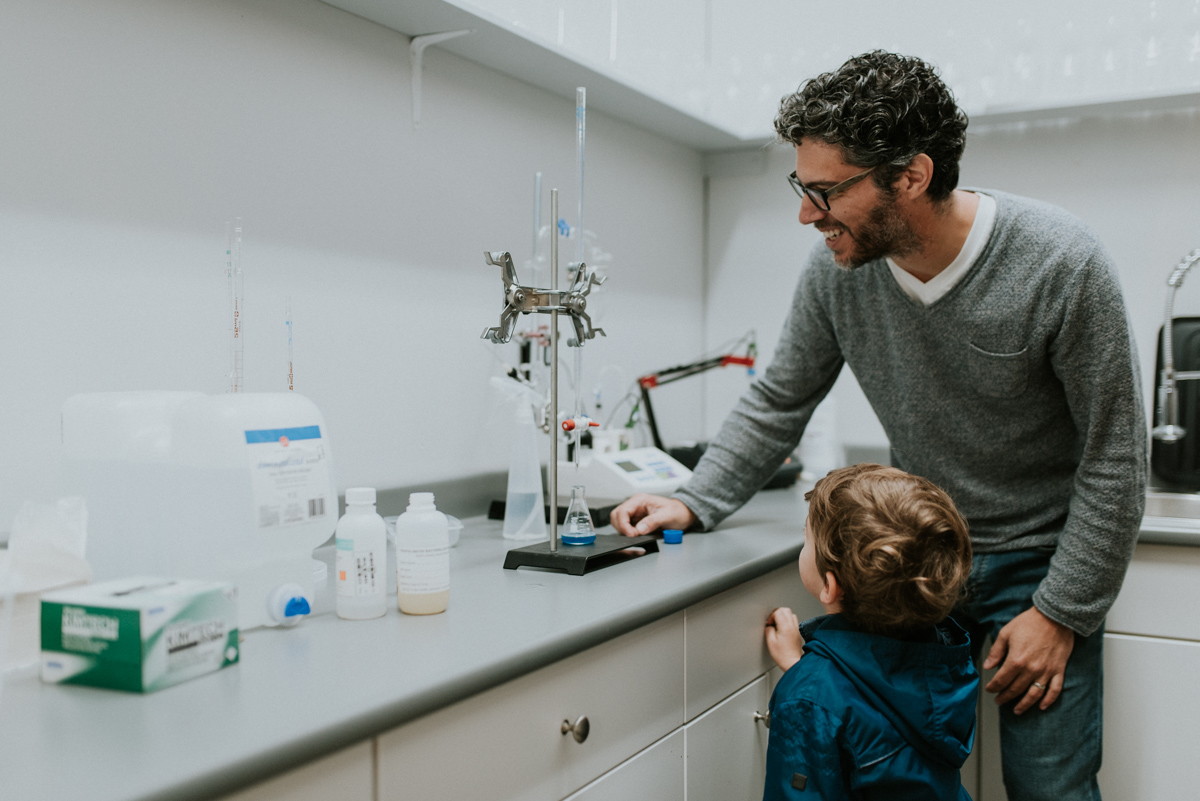
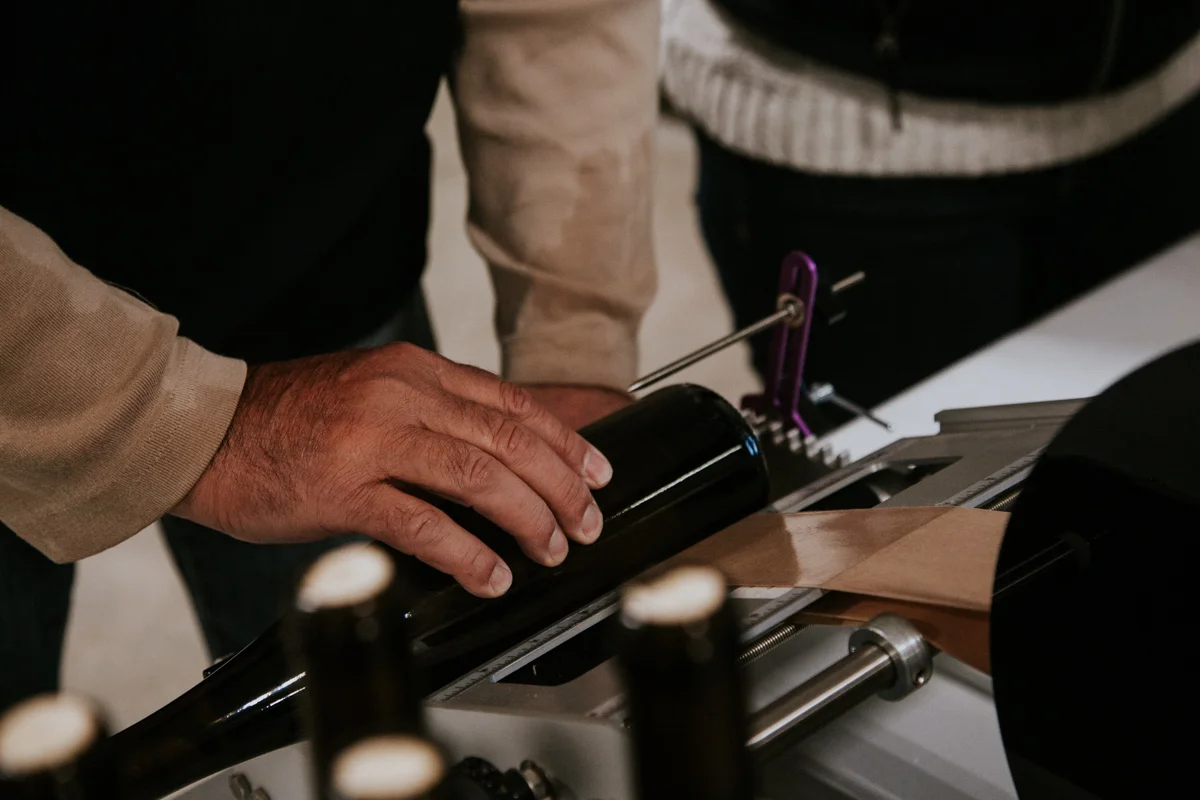
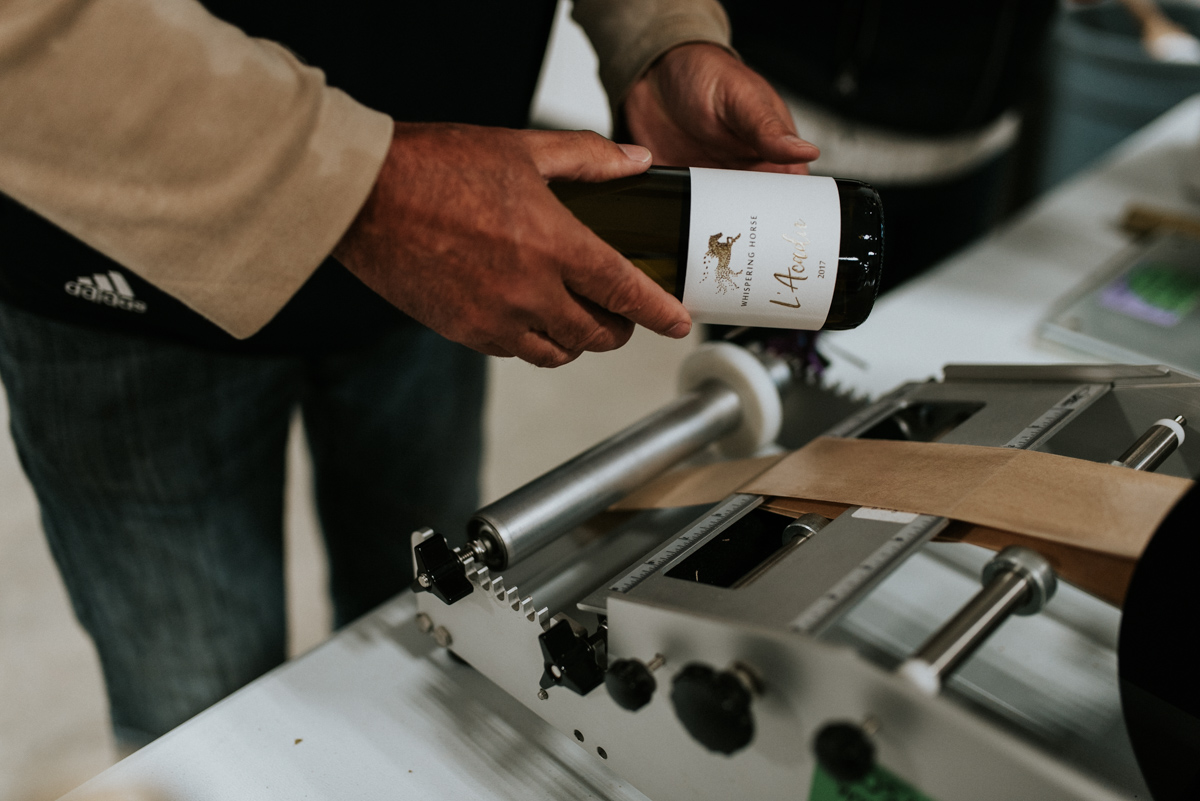
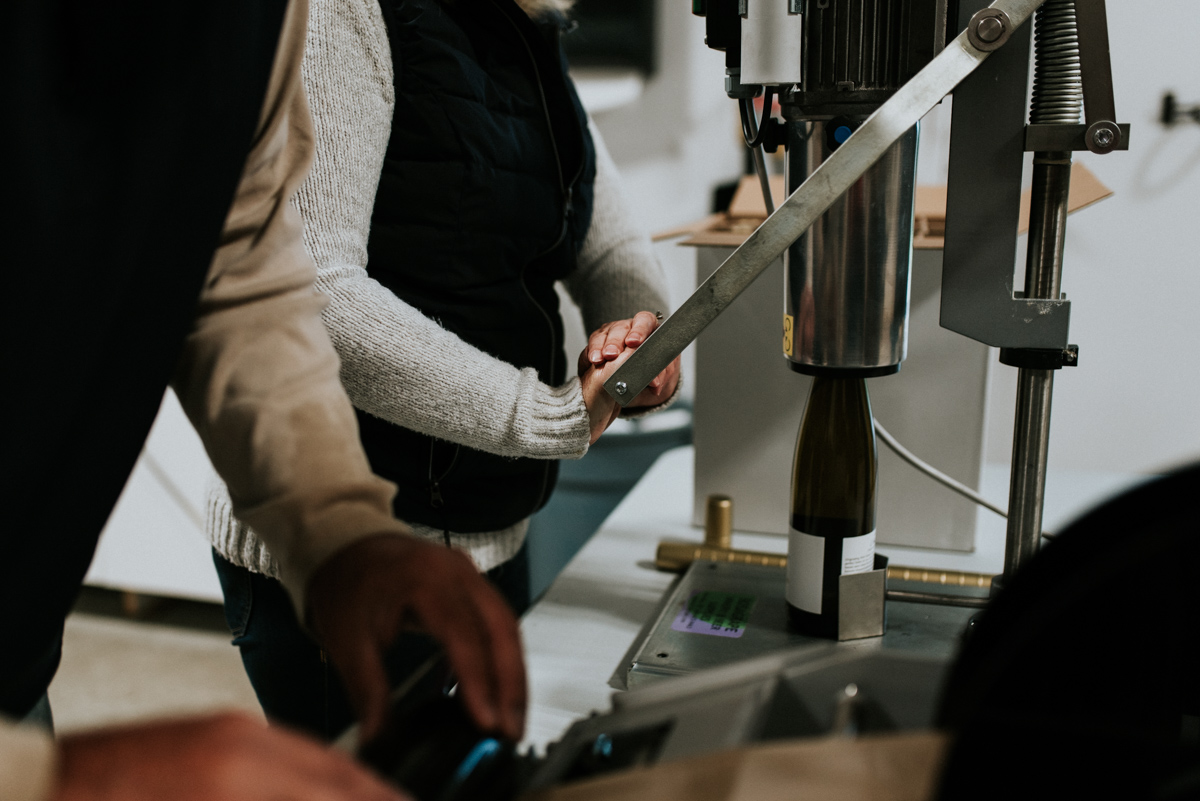
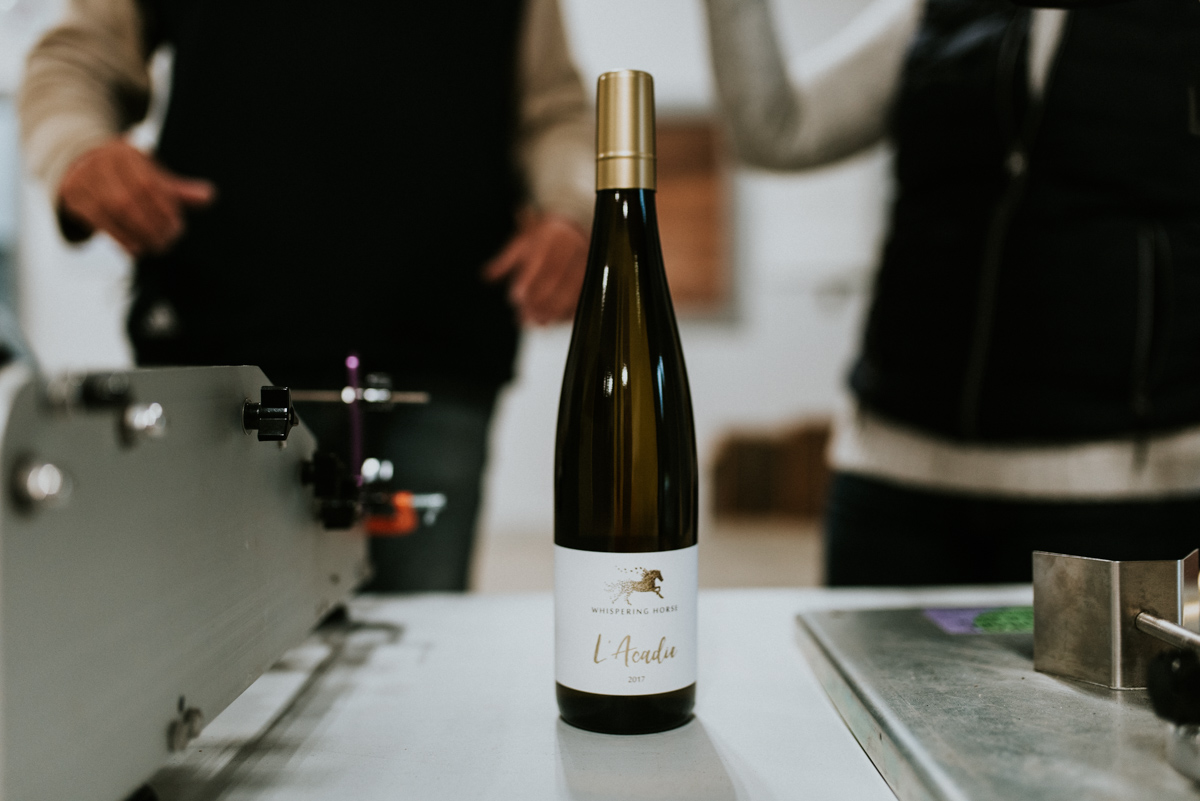
TFV: Tell us a bit about your lives outside of Whispering Horse Winery.
Melissa: I’m currently on maternity leave with our eight month old baby, Elio. We also have our four year old son Luca. Caring for them fills much of our time outside work at the winery. After my leave is over, I’ll be going back to my position as a post-doctoral researcher at the University of Victoria, at the Institute of Aging and Lifelong Health. There, I contribute to a number of projects as a health geographer, exploring the significance of ‘place’ for diverse populations at the end-of-life.
Laurent: I could reply that when I am not making wine, I like to drink it. But for that, you need time, and, as my wife mentioned, we are being kept quite busy with our two young sons. During the week, I spend my days talking about literature and philosophy in the school I am teaching at. And when I am not teaching literature, I write. Poetry has always been a passion, whether it is on paper, or in a glass of wine.
Barry: I’m still working four days a week at Pioneer, where I am the general manager. Outside that, I enjoy spending time with Shirley and our family and friends. I enjoy writing music and playing guitar. I also enjoy watching all sports and try to get in some golfing through the season. We love to travel when time allows.
Shirley: Family is really important to me. I love spending time with our kids and grandkids, going places and doing things with them. Barry and I love to travel, especially to Europe. I also love golfing, going to live theater, be it here in Chilliwack, or in Vancouver, and wining and dining, at our favourite restaurant in the city. Spending time with friends is also important. I like to explore my creative side, so I have taken acrylic paint and silver smithing courses in the past.

TFV: How would you define community and family?
Melissa: It is funny because I was just having this conversation with someone about how ‘community’ seems to be used so often in marketing these days, but what really does it mean? It’s a good question. I guess to me it’s a multifaceted concept. It can be defined geographically, but I think it also involves a group of people who share common values, beliefs, identities, and also care about each other. It’s these caring relationships that, to me, make belonging to a community something meaningful. Since we opened the winery, we have been overwhelmed with the encouragement and support we’ve received from other businesses and individuals in the Fraser Valley, who genuinely want to see us succeed. When taking the risk that we did of opening a winery in Chilliwack, and by using only estate grown grapes (!), this support has meant the world to us. It’s very reassuring to feel as though you are not alone in this, that other people have your back, and on the other hand, empowering to know we have the potential to create a space (with our future tasting room) that will foster these community relationships and allow people the opportunity to gather together, unwind, and enjoy themselves while sipping on our wines.
TFV: What is your favourite wine that you make? What would be your go-to meal to pair it with?
Melissa: We haven’t released the wine yet (it will become available next year), but my favourite is our L’Acadie sparkling wine. The perfect pairing for me with this wine is a bowl full of buttery popcorn and a warm and cozy blanket.
Laurent: I am a perfectionist, so my favourite wine is the wine I will make next year.
Barry: I really enjoyed our 2017 Pinot Gris Rosé paired with grilled prawns or seafood fettuccine.
Shirley: Right now, we’ve only had the two wines that we released this past summer, our L’Acadie and Pinot Gris. I think both of them are delicious, but found I was drinking more of the rosé this summer. In the future, we will have our sparkling’s ready so I may just have more new favourites then! I’d pair the rosé with a salad of mixed greens, sliced fresh strawberries, candied pecans, and either feta or mild goat cheese with a light vinaigrette dressing. To make more of a meal, I’d add some grilled chicken breast.
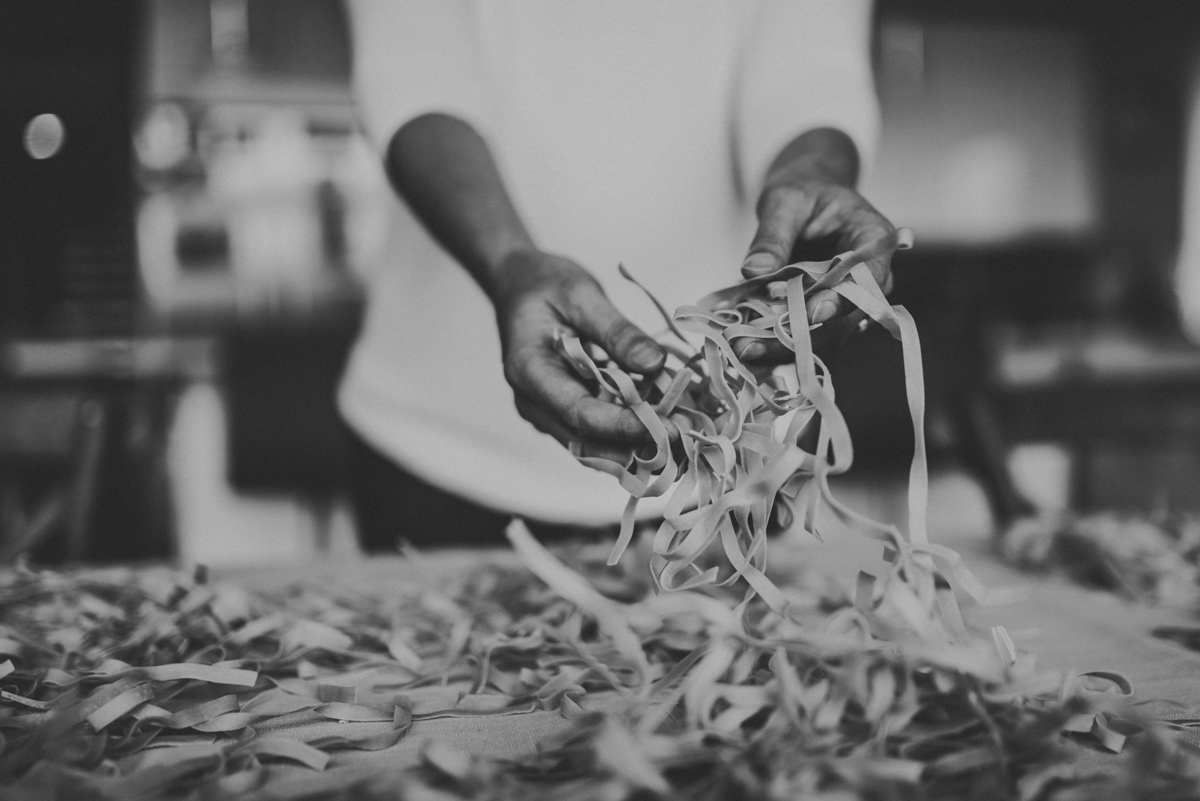
TFV: For having little experience in the winery industry when you began your journey, what pieces of advice would you share with entrepreneurs looking to venture into something new?
Laurent: Be patient. Be flexible. Be willing to learn. Understand that what you are doing is bigger than you, and that you can’t control everything. But most important: Be passionate. If you don’t have a true passion (an obsession, I should say), you won’t last in this type of business.
Barry: Trust and believe in yourself. Study, ask for advice and learn as much as you can before you make a decision. Be cautious on expenses. Don’t set yourself on a path that you’re not willing to change directions should opportunities come up.
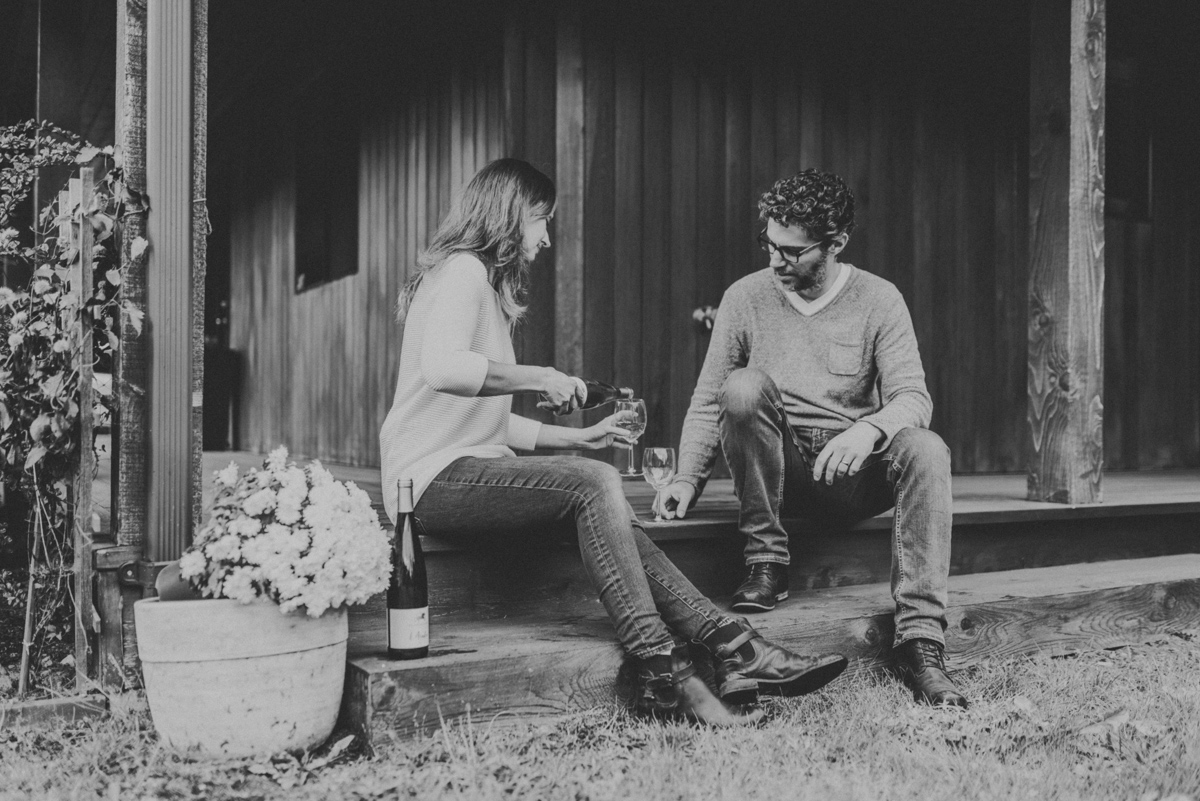
Red or White Wine?
Melissa: Too hard to choose one! It depends on my mood, the season, and what’s on my plate!
Laurent: Orange
Barry: Red, I love Brunello.
Shirley: I don’t have a preference really – I love both red and white. It also depends if I’m eating, and if so, what I’m eating. But, I love Italian and French red wine mostly, and for whites, I like Pinot Gris, dry Riesling, or a Sauvignon Blanc.
City or Country?
Melissa: Country (but still close enough to the city that I can enjoy the restaurants, art galleries, and shops that cities offer)
Laurent: Country (in Europe, when you are always close to a nice city)
Barry: Definitely country, but I enjoy what the city has to offer also.
Shirley: I used to be a city girl, but I’m definitely country now. I love all the nature and space I have surrounding me. The pace of the city is exciting, and it’s nice to visit, but I couldn’t live there.
Books or TV?
Melissa: Not too long ago I would have definitely said books, but with a 4 year old and 8 month old baby I’m just too tired to read. So TV it is, sadly.
Laurent: Books without any hesitation. TV is a waste of time.
Barry: TV
Shirley: I can get lost in a good book, but also like a little tv time.
Night owl or early bird?
All: Early bird.

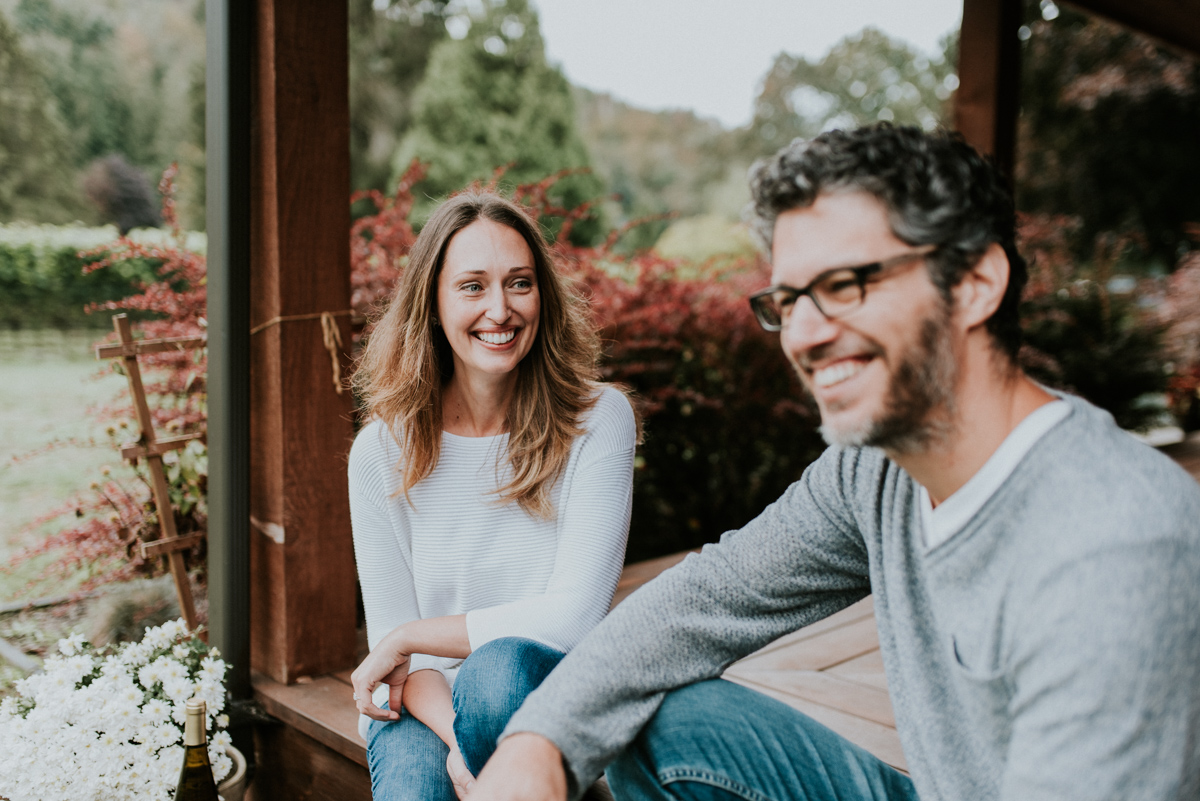
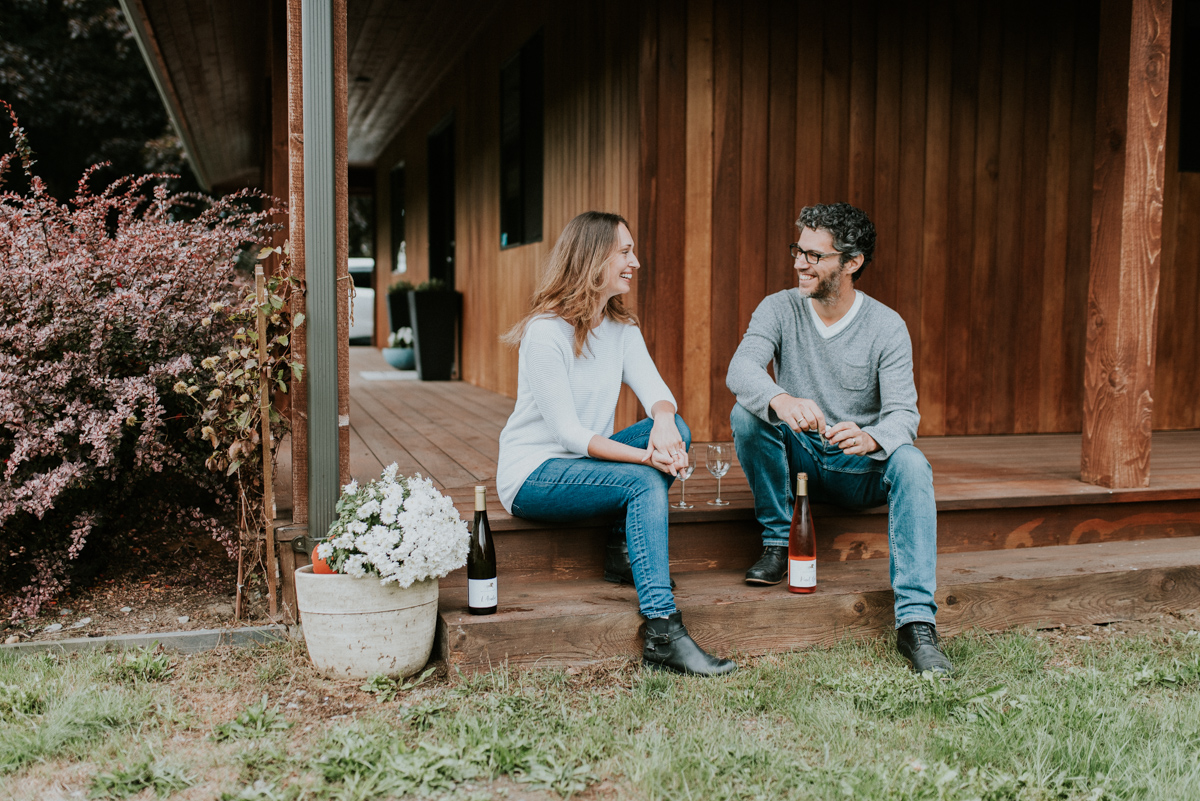
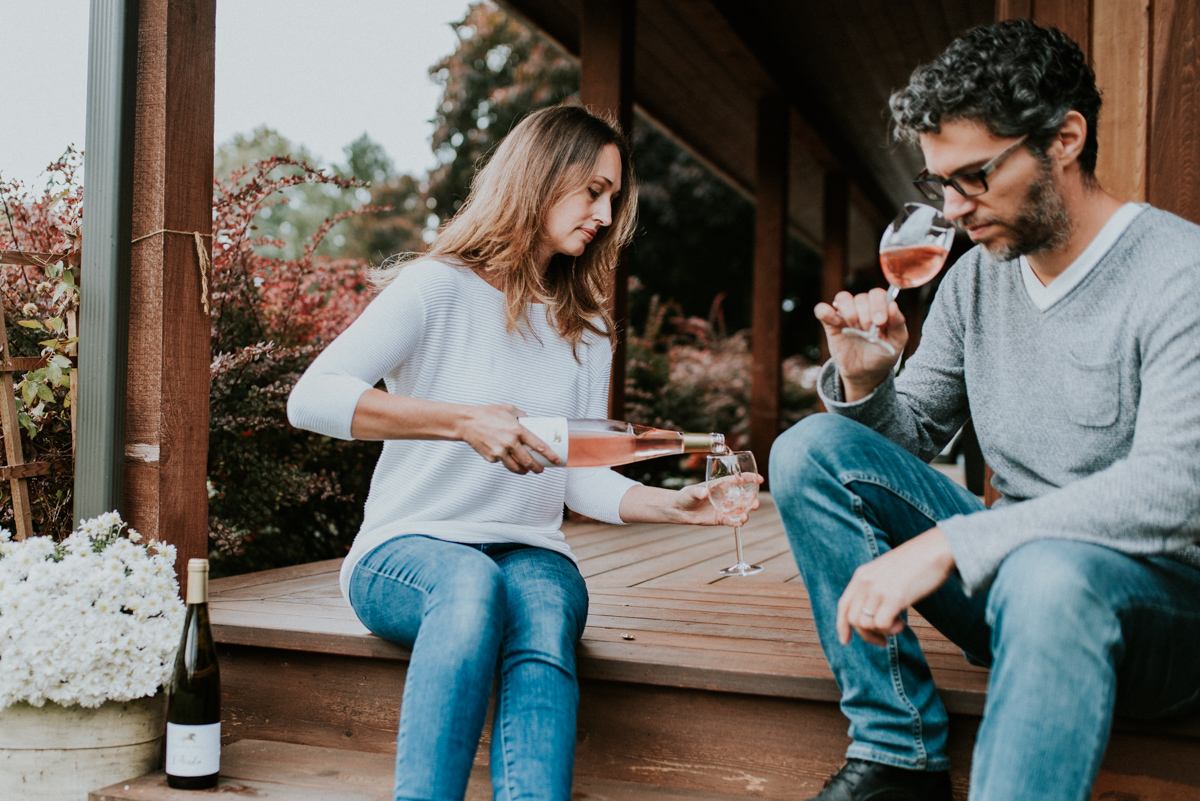
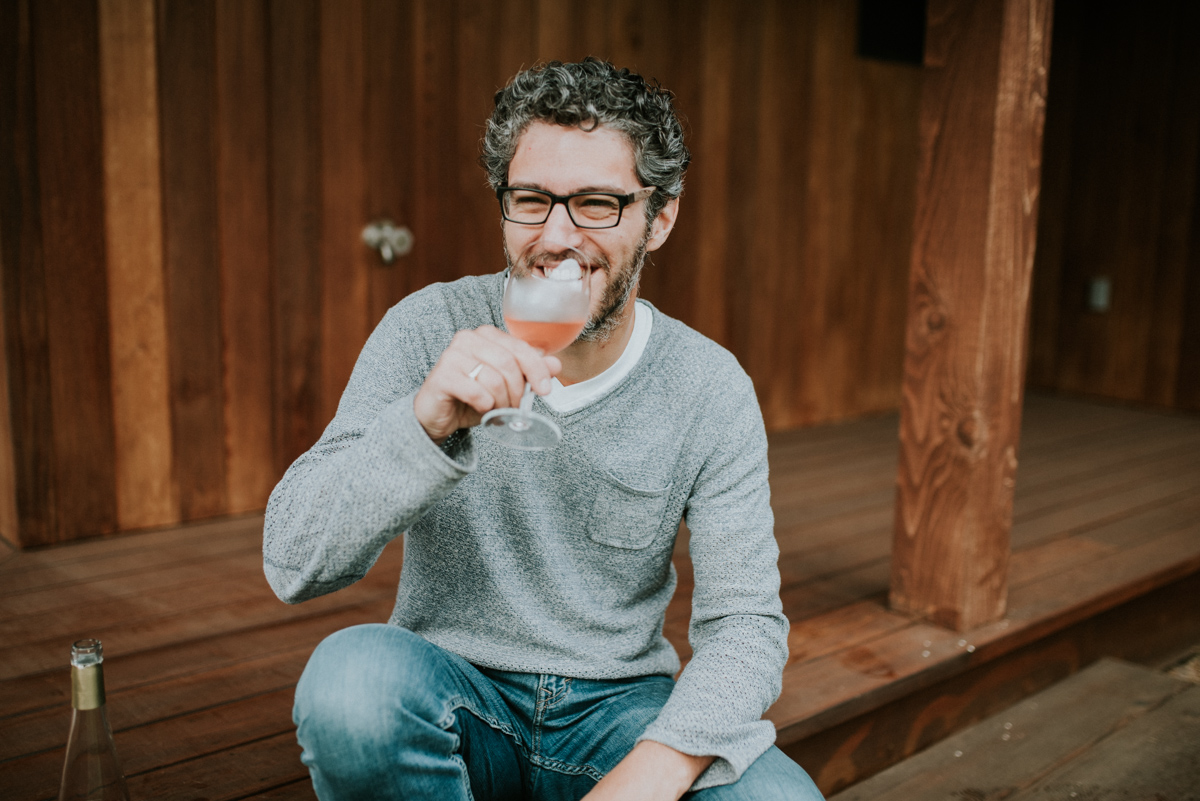
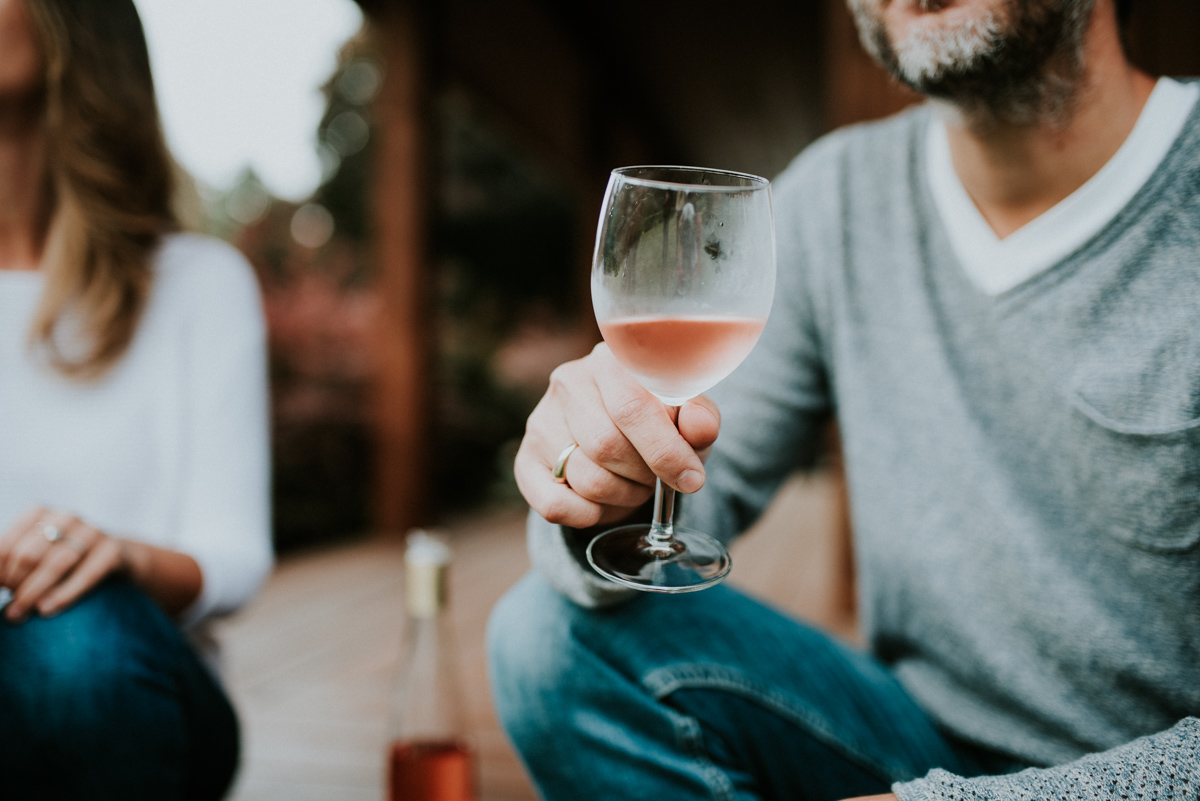
TFV: What are your favourite seasons here in the Fraser Valley? Why?
Melissa: I love summer, the heat, the long days, all that sunshine. There are so many beautiful places that just come alive in summer, like my favourite spot down at the Vedder River. It’s our neighbourhood’s best kept secret!
Laurent: I like our mild winters, they remind me of Belgium.
Barry: I love spring, watching everything come to life and the excitement of the seasons ahead.
Shirley: I absolutely would have to say the spring. After our dark and rainy winter, I love to start seeing more sunshine, the new growth of plants and flowers, and getting my garden ready to plant.
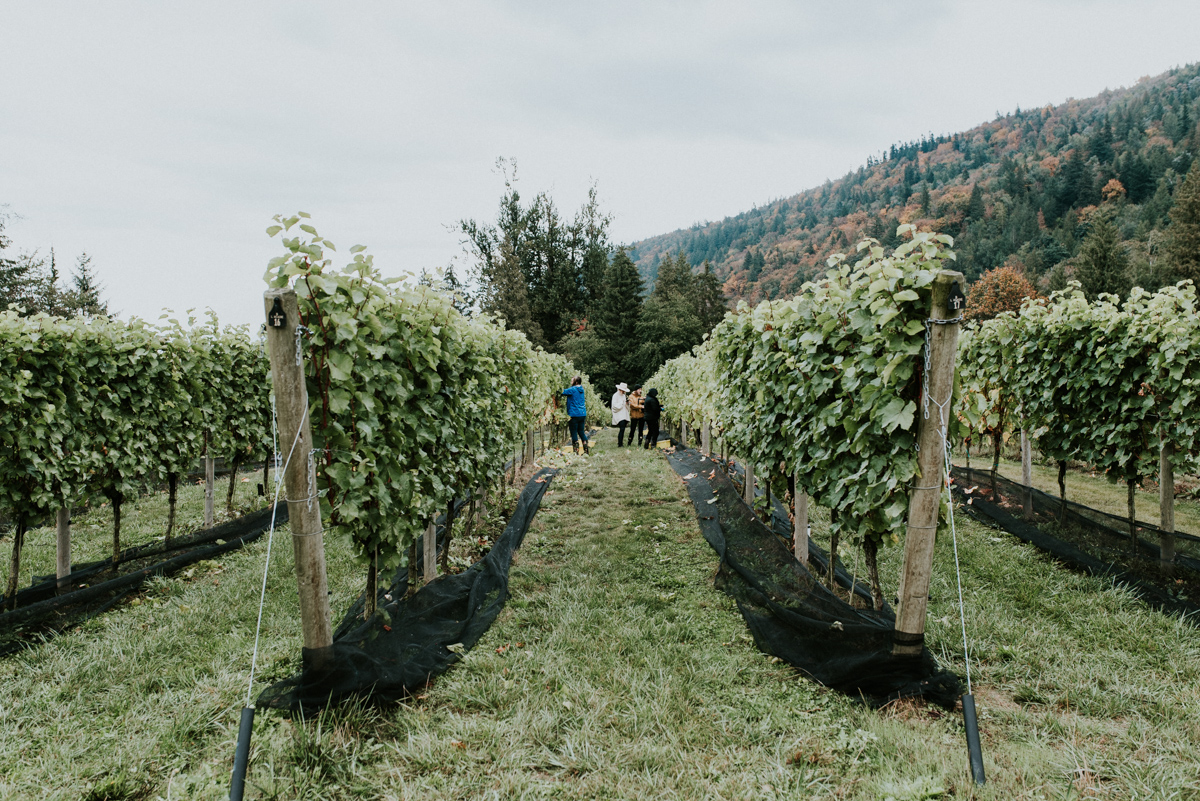
TFV: What is one thing you want people visiting the Valley to know about your home?
Melissa: I think I’d want them to know that the Valley has so much more to offer than all our beautiful mountains, rivers, and lakes. There is a real momentum of change going on culturally, where people are increasingly making the choice to support our rich array of local producers and makers, rather than relying on big-box stores and produce grown half-way around the world. This cultural shift in the market has had a real impact on us in the Valley, as many more people, including those in the younger generations, are actually seeing a value in things like farming, producing local artisanal goods, and even starting wineries! As part of this momentum, we are seeing so many unique and amazing local businesses continually pop up and become incredibly successful. There are also some really great initiatives underway, like the Valley Food + Farm Collective, that aims to contribute towards creating an actual ‘food culture’ here in the Valley, and to create a ‘food hub’ by bringing numerous local smaller-scale farmers and producers together under a common umbrella, in order facilitate the distribution of their goods to users, like restaurants, chefs, and the public across the Lower Mainland and Vancouver. It’s these types of initiatives, and the passionate people behind them, that make me excited to be in the Valley right now.
TFV: If you were a destination, where would you be?
Melissa: I would have to be a secluded sandy beach, definitely somewhere warm, with turquoise water, colourful fish swimming in the depths, and lots of lush greens in the distance.
Laurent: Pavullo, in Emilia-Romagna (Italy). This is where my dad’s family is from. It is a village in the mountains, near Modena. The food is amazing, as well as the people (most of them are 70+ years old, but still dancing until midnight!).
Barry: Tofino – I like the forest and ocean, the different seasons it offers, and the peace and tranquility
Shirley: I would say anywhere where I can be surrounded by nature and near water, be it beachside or lakeside.
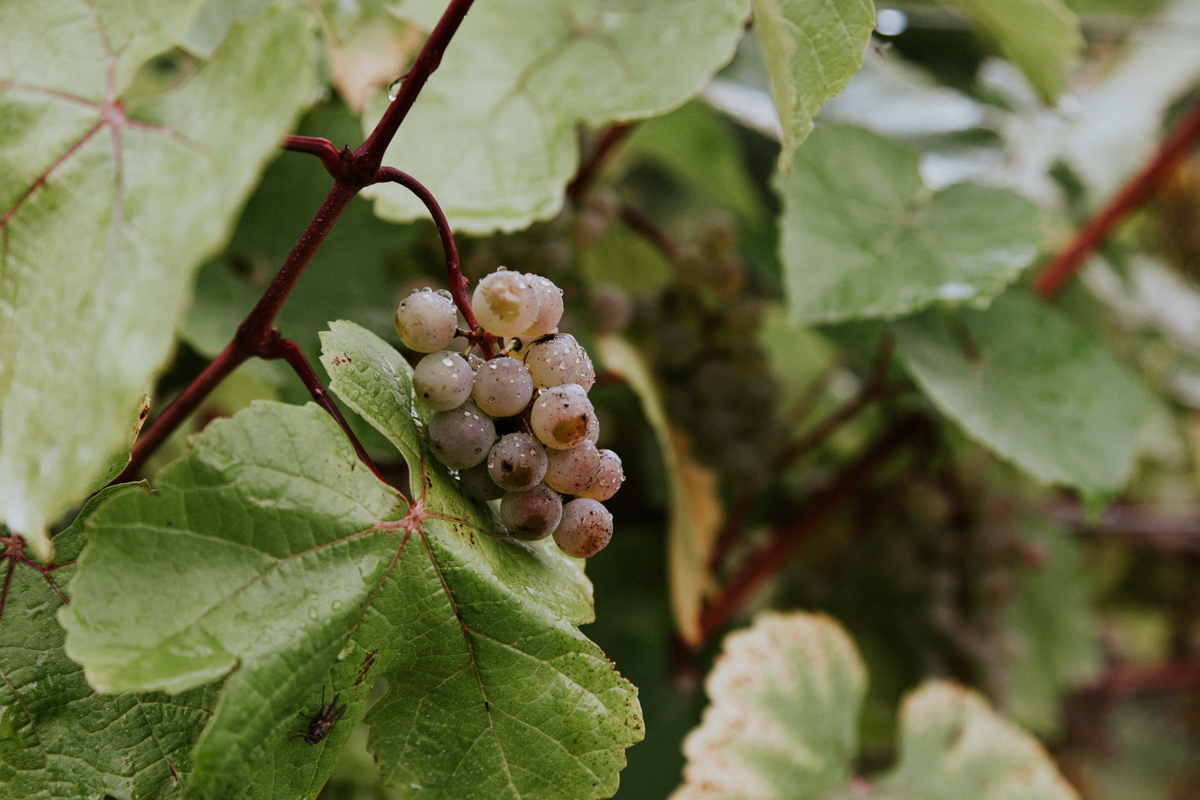
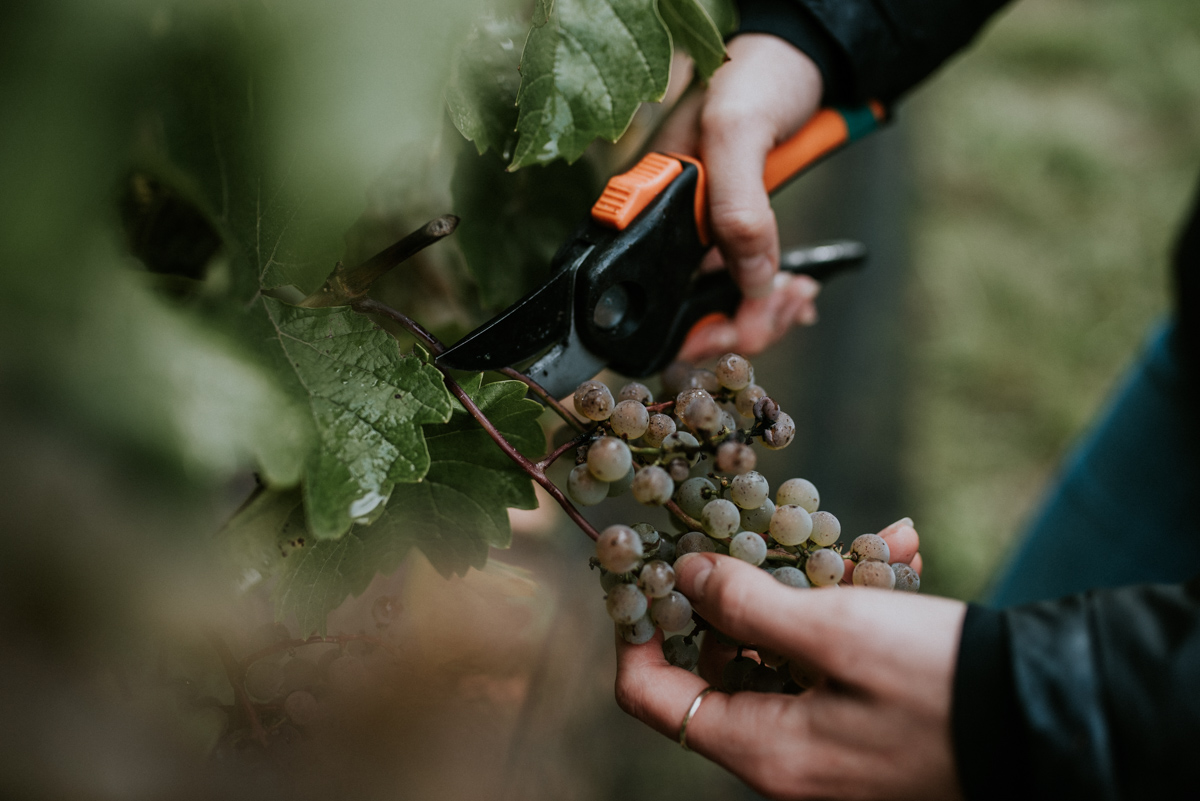
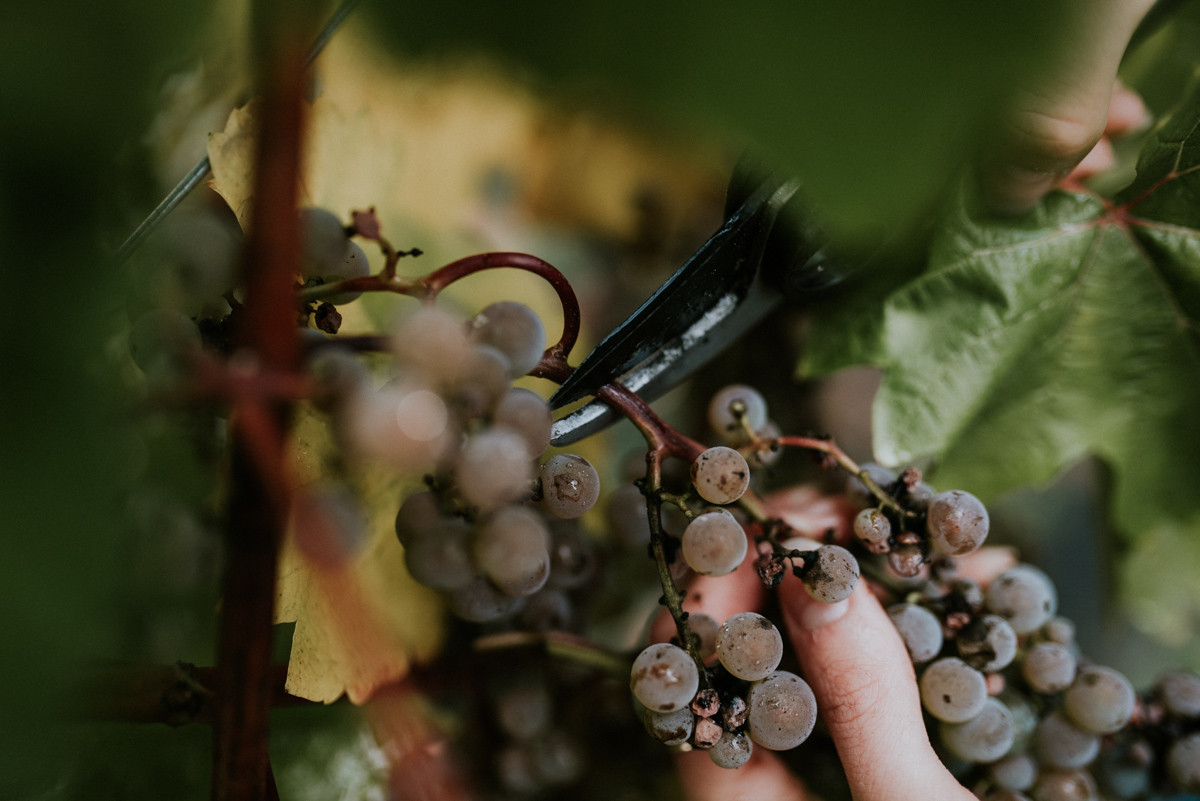
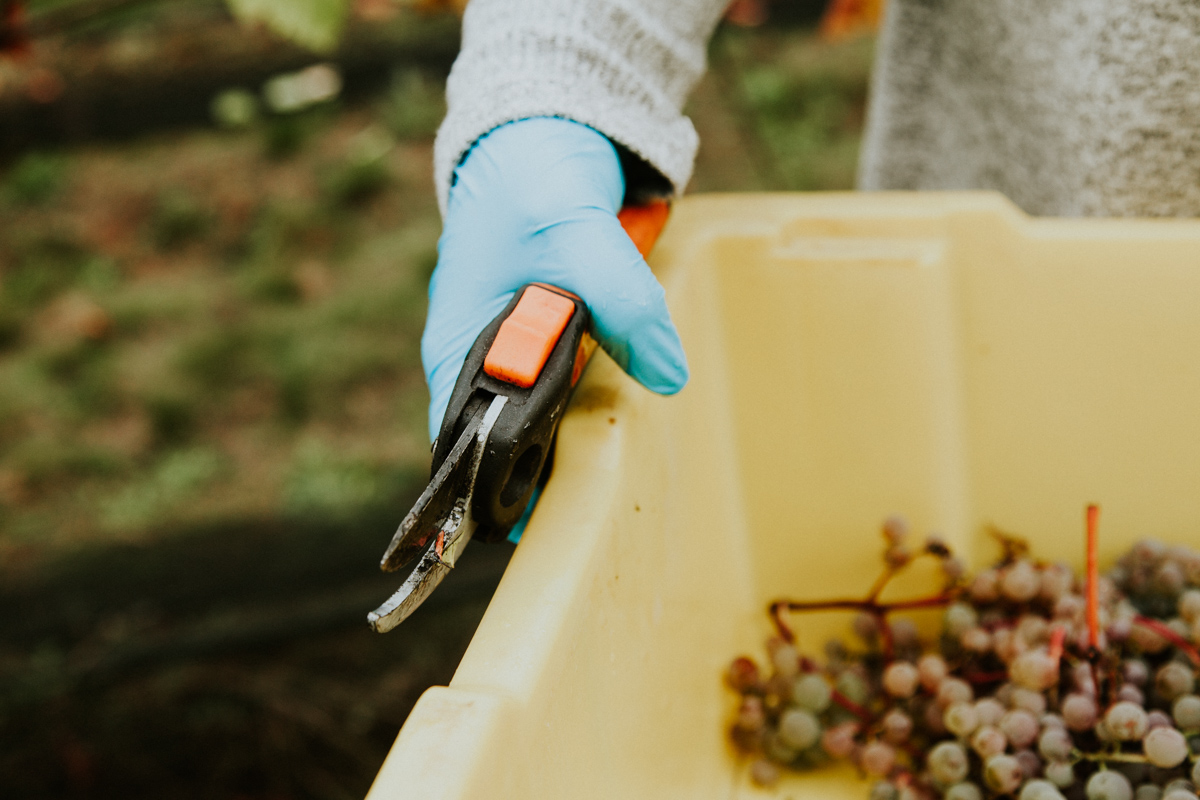
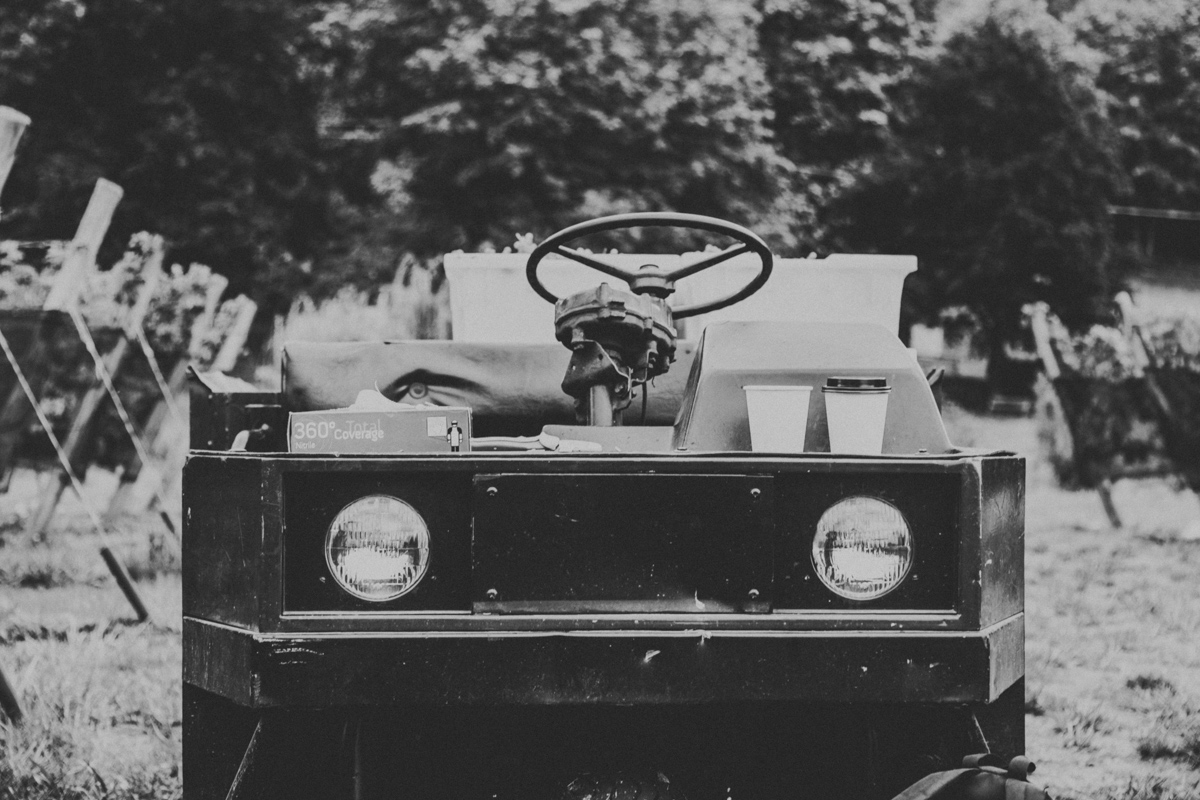
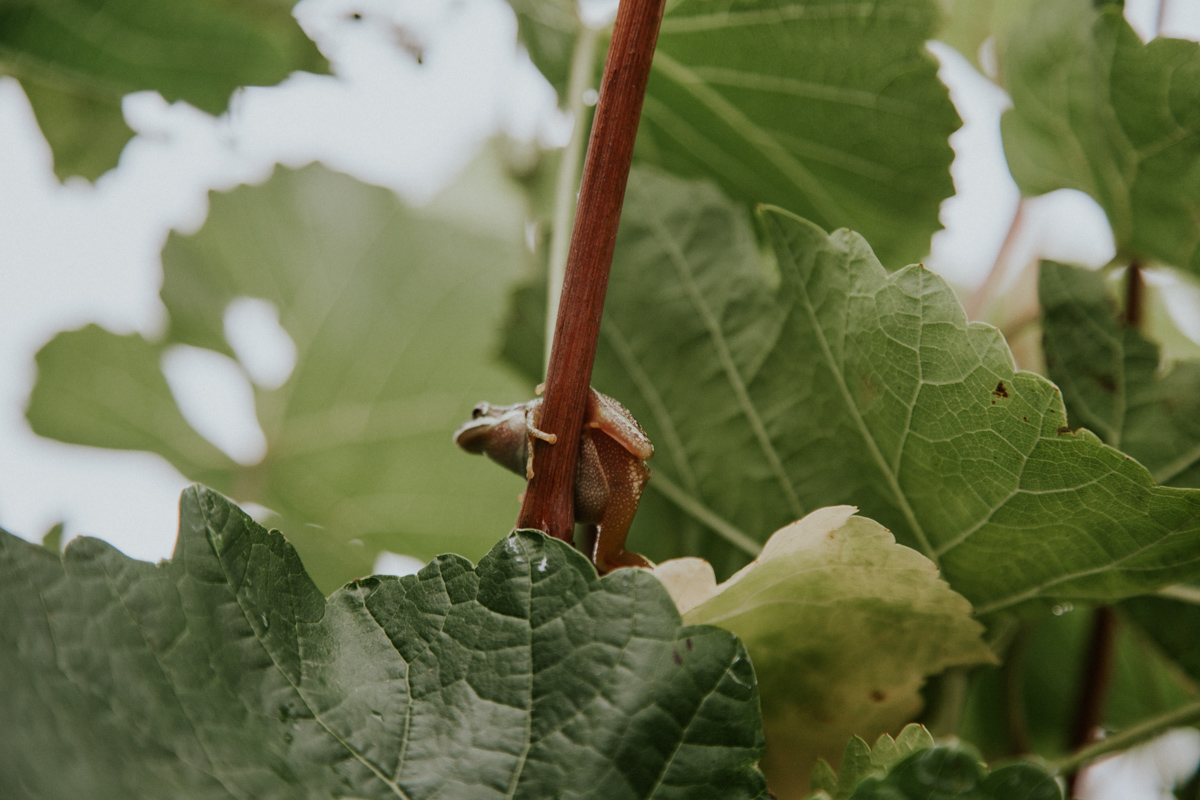
Happy to share every aspect of their process, our time at Whispering Horse Winery was a ‘true day in the life’ adventure and we couldn’t be more thankful for the knowledge they shared. They are a family who proves that with hard work, patience and a lot of passion you can do anything you put your mind to.
